#thinking about stories in terms of punishment and what characters deserve is a trap
Explore tagged Tumblr posts
Text
Re: @fieldofheathers-stuff
I think approaching Arcane as a tragedy is interesting because I actually never got a tragedy vibe from it. Probably because I believe it ends on a more hopeful note. Cait and Vi together, and particularly the airship sailing into the distance. Even without the implication that Jinx is alive and on board, it's just a hopeful image imo. (I'm also coming into this with the assumption that no body=not dead. For Jinx, that's obvious, and i think you're supposed to conclude that she's alive, or at least it's very open ended. But I also think that it would be easy to bring back Warwick, Jayce, and Viktor too.)
If we're talking about tragedy, I think it's useful to have a more specific definition. There's Greek tragedies - trying to escape fate and failing. And Shakespearian tragedies - when the hero's greatest strength becomes the source of their downfall. (And there’s probably others and more detail you can get into, but I'm just talking about what I remember from high school, lol)
And there are definitely story arcs that are mostly tragic, in both senses. Like Jinx trying to escape the fate of killing the people she cares about. And Viktor’s unswerving determination to make something of himself being both the cause of his rise and his fall.
But then there's a reversal at the end of their stories. Jinx uses her destructiveness to save Vi, her curse becomes her strength. Viktor's determination is met by Jayce's determination to save him, and the inescapability of their friendship. For both of them, the mechanic of the other kind of tragedy takes over. And both of them find a kind of redemption, rather than the utter ruin that's typical of tragedies.
(This is all just occurring to me now btw)
Re: @klorophile and the idea that season 2 should have gone differently.
I disagree with that. I think the two seasons really need to be taken as a unit. The fact that season 2 involved things becoming their opposite doesn't change that they're a single story - again in Shakespeare things becoming their opposite is part of the tragedy. I also don't think the end of season 1 really functions as an ending on its own either, to me it's more of a turning point.
I also think it's a mistake to say that the message is that "you pay the consequences for your actions." That’s punishment, not consequences. Consequences can be unforseen, they can be chaotic, they can be entirely disproportionate. I think that's established very early on.
I also want to point out that in my original post, I'm talking about plot, not themes. Like the way the story is structured. It's more about characters dealing with stuff than trying to accomplish stuff.
If "consequnces" are a theme, I don't think the show is saying that consequences are payment for wrongs. It's just that everything is connected. Everything is part of a chain of actions and reactions, that you cannot control. At most, the show is saying that it's vain to think that you can plan and forsee all the consequences of your actions.
And season 2 was absolutely necessary for that, because season 2 is when things really got chaotic and out of control.
It's not about characters having to pay consequences. It's about characters having the "oh shit, this isn't what I thought it would be" realization. Every character goes through that. Where they get what they thought they wanted, but it comes along with something unexpected and unwanted.
For Caitlyn, she's always had a very strong sense of justice, and in season 1 she's always fighting against those with more power than her. And then in season 2 she is in a position of power, and she immediately does bad things. Her sense of justice doesn't matter. No one in power is innocent. That's what I get from her arc, and whether or not she suffers as a result of her actions is irrelevant. (even though she does lose an eye. that's pretty serious). She failed and she has to live with the knowledge that she failed. The consequence of her failure is that she brought war to her city.
With Jinx, it's very heavily implied that she did not die, that she escaped the explosion through the air ducts and left Piltover, that she broke the cycle and walked away. Which is what she wanted, she wanted to be free from the cycle of killing and death.
But even if you do take her ending in season 2 as a true death. She's not paying a price for her mistakes, not at all. There's a schnee video that gives a really good take on this, even though I disagree with him and belive that Jinx is alive. All Jinx ever wanted was to help the people she cares about. But time after time, she's cursed, she hurts them instead. Even when she starts to turn things around, Isha dies anyways. So Jinx sacrificing herself for Vi is a way for her to finally save her sister. Blowing up their father figure with the monkey bomb saves the day instead of destroying everything. (But again, she's not really dead).
And to reiterate: the thing that changes about consequences for season 2 is that they become chaotic and unpredictable. This is described in the "pass me a tome" scene. There's a series of clear actions and reactions, but at a certain point, if a system is agitated too much, it starts producing unintended outcomes. That's what the wild rune is, that's what Isha falling into Jinx's life is, that's what Warwick is. Order and chaos is another big theme in the show, and season 1 covered the order side of things, it involved science mastering magic. Season 2 is the chaotic outburst that follows.
Regarding Viktor and Jayce, Viktor was the one who had to be stopped most of all, because Viktor was the one trying to remove disorder from the world. Jayce believed hextech was a curse because it created the apocalypse world that he experienced, but for that to come about it required Viktor as a catalyst, so Viktor being taken out was more important than eliminating hextech. The role that Ekko plays is very simply communicated in the line, "that device can't be". It's the contradiction that still exists despite all of Viktor's efforts that breaks through his armour.
For Vi and Jinx, yes they can mend their relationship and relate to each other as equals, but like I said in my original post, that's not really the point of their story. They can be sisters again, they can still love eachother despite everything each of them has done. But they're still stuck in a cycle. What Jinx needs most of all is not a good relationship with Vi, what she needs is a fresh start. She doesn't need to rewrite her story, she needs to build something new. And saving Vi, fixing their relationship, means that Jinx can start fresh without that baggage weighing her down.
And this comes back to my reply to fieldofheathers-stuff. In that I think Arcane is structured like a tragedy, but it's also not. I don't think it has a totally sad ending. Things are melancholy for Mel and Ekko. But Jinx is free to start something new. Vi and Cait get to be in love. Even Jayce and Viktor, their story ended with love and camaraderie.
Every work of fiction involves the creators pushing the characters in a certain direction because they want it to end a certain way. The real question is how natural it feels. I think Arcane does feel natural, because the characters do not wind up with the endings they "deserve", they end in a place that feels organic considering their journeys and their conditions.
I've been thinking about how I would most concisely sum up the plot of Acane. Because I think a lot of the complaints you see come from some people result from expecting it to be a certain kind of story that it's not.
And I think the most concise way to put it is that Arcane is about consequences. The first episode starts with an explosion, that the characters spend the rest of the arc dealing with the repercussions of. And then the first arc ends with two massive events - Powder killing her family and the invention of hextech - that they spend the entire rest of the show dealing with.
I think most of the stories we get from Western media are about achieving or accomplishing something, or the failure to achieve something. And you can frame Arcane in those terms. But I think to best understand the story, you have to step out of that typical framework. Because the thing with an achievement-based story is that there is a particular end goal in mind, and I don't think Arcand has that.
Like take Vi and Jinx, for example. A typical way to frame their story would be that it's about two sisters trying to rebuild their relationship. That presupposes a certain ending: They either succeed or fail at their relationship, and that's what the focus is on.
But it's not about that. It's about - how do you deal with an event that fundamentally changes you?
In season 1, Vi's answer was to recapture what things were like before. In season 2, they try to redo the past (saving Vander) and get a different outcome, but that's impossible. The answer comes with Ekko - to build something new.
And this is all over the show - action and reaction, how the arcane wakes up, killing is a cycle.
#arcane thoughts#arcane#thinking about stories in terms of punishment and what characters deserve is a trap#long post#jinx#Viktor arcane
211 notes
·
View notes
Text
The Dragon Prince's "Mercy" Motif
TDP Fam, this is so fascinating.
I made this post about the connection between two characters' names. Nothing is coincidental in this show. The creators have things mapped out for future seasons.
🚨Spoilers below! 🚨
We know this arc is called The Mystery of Aaravos, and so far - in the show, anyway - he does appear more malevolent than benevolent, using characters as pawns (Viren, Callum, Claudia) to achieve his means (freedom). He was one of the Great Ones, but he lost privilege and title, becoming known as The Fallen Star. It was revealed that he's been behind wars, manipulating leaders for centuries, and so he was locked away because he was too dangerous. (If you're reading this, you've seen the show and know all of this.)
Now...E1S6 (which was previewed at NYCC) opens with a conversation between him and another Startouch Elf. He's distraught - it's the first time we've ever seen Aaravos showing such incredibly desperate emotions. (As I've mentioned, he's being painted as a sympathetic character.)
First, you wanna make a bet these statues depict the very scene featured in S1E6?
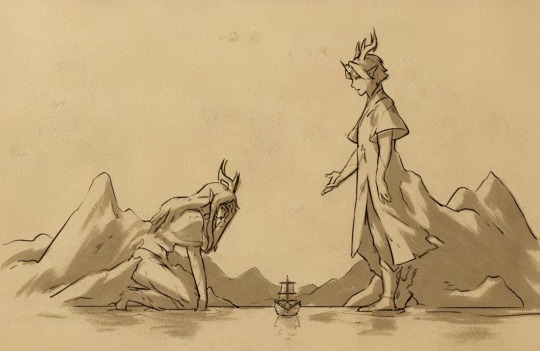
It's too perfect.
Now, this elf is called The Merciful One. As I pointed out in my other post, there is another character that is associated with mercy. You guessed it:
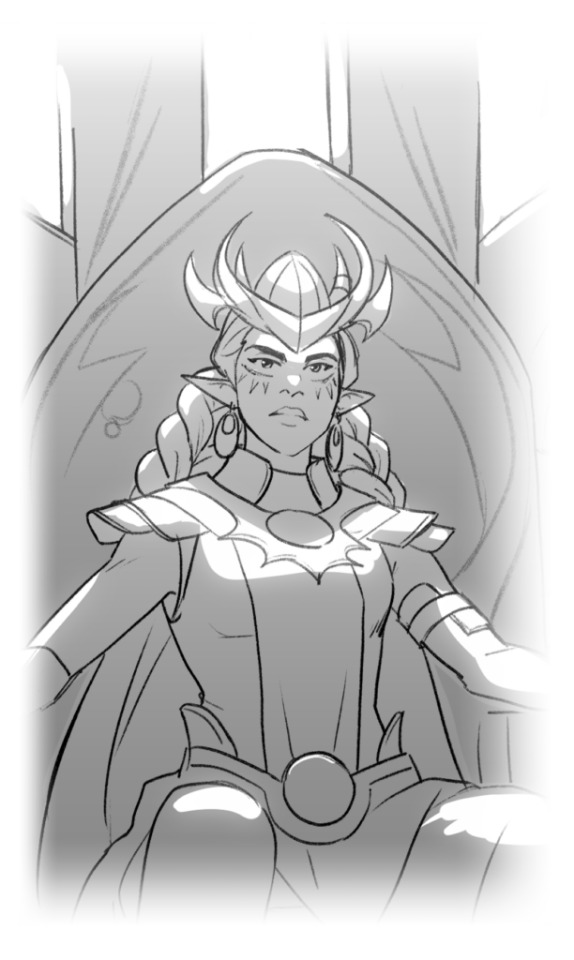
Her story is literally called The Queen's Mercy and one of the many titles bestowed upon her (if you read the story) is Queen Aditi, the Merciful. (I've already done the math in this post here.)
Now, why is this so fascinating?
Mercy, by definition, is compassion or forgiveness shown toward someone whom it is within one's power to punish or harm. (Thanks dictionary.com.) But as we know from reading The Queen's Mercy, Aditi isn't merciful at all. She's cunning. Kim'dael goes to Aditi seeking sanctuary. What does she get in return? A Mercy Debt.
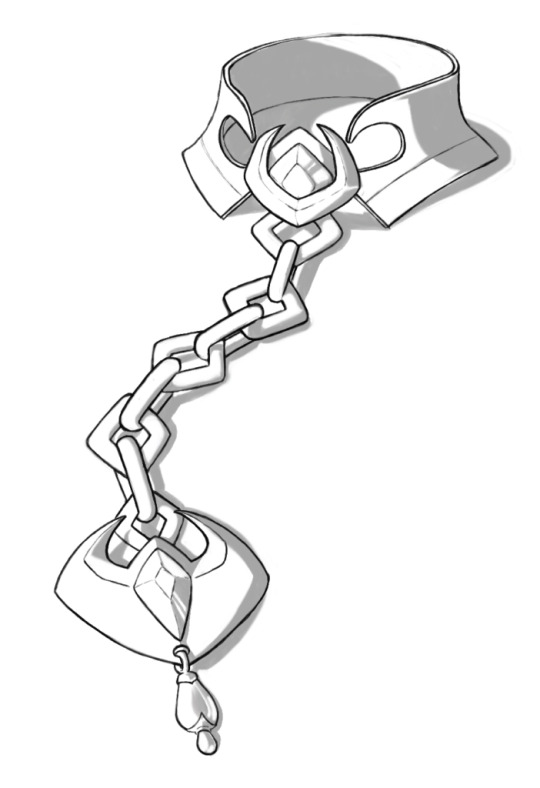
Could this be considered merciful? I mean...she did not banish or harm Kim'dael. But she's trapped eternally, and literally owes her life. Kim'dael is a villainous character, no doubt - but that is not compassion or forgiveness. (Whether or not she deserves it is a different conversation.)
Now let's go back to Aaravos and the Merciful One, shall we?
If you look the images, Aaravos is clearly distraught, and yet the Merciful One appears calm, cool, collected. We can assume he's...well, granting mercy.
By what? Imprisoning Aaravos? This could very well be the moment he is imprisoned.
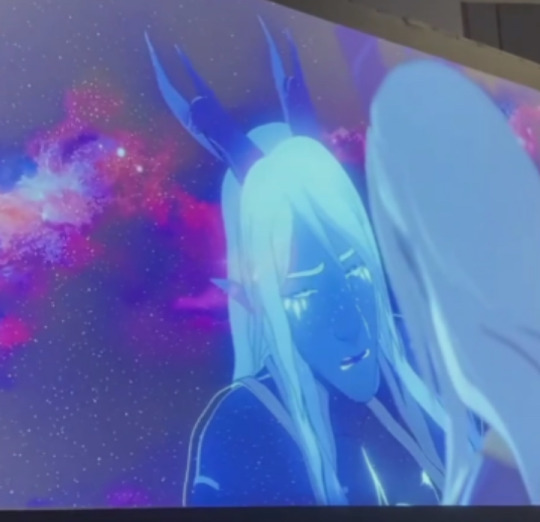
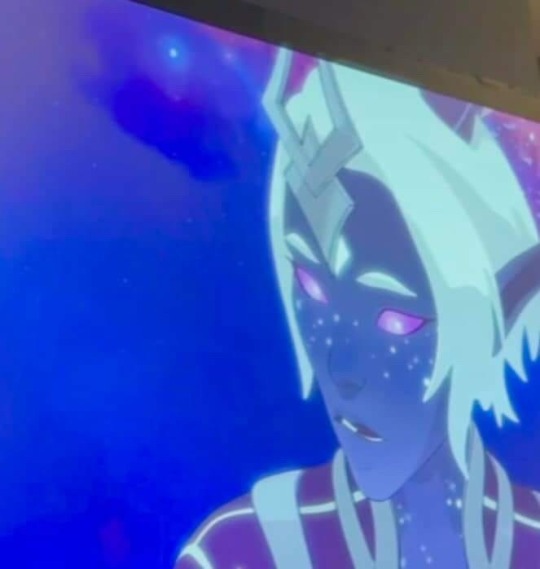
But is it true compassion? Is it true forgiveness? Or is it, "I'm granting you something in my power because - even though it seems wrong to you - it's for the greater good." I could see Startouch Elf philosophy being cold and factual, distant and matter-of-fact - leaving no room for matters of the heart or emotions. (Doesn't this elf reference that Aaravos is in this position because of love [and I suspect has something to do with Leola]? If someone can get me their exact quote, that would be fantastic.)
This opens up a really interesting conversation regarding the term 'mercy' - because what I think is happening here is that there are two characters in power (The Merciful One and Queen Aditi) who are technically granting 'mercy' (although I am only hypothesizing based on the new Startouch Elf's name), and yet it is not at all merciful to the character. It's almost as if they're both saying, "Yeah, this sucks for you right now, but it's going to be better off for everyone else in the end." Kim'dael is 'imprisoned' by the Mercy Debt. Aaravos is literally imprisoned.
I mean, Kim'dael is in the same position as Aaravos' statue in the Sea of the Castout.

I don't think this is a coincidence. I think both of these things will come back to bite our beloved Dragang. They are the ones who have to deal with the consequences, after all.
Did they deserve this treatment? For Kim'dael - I'm leaning towards yes, she is clearly a villain and has done horrific things.
And...we know that Aaravos has something to do with Aditi's disappearance.
But did Aaravos deserve this - imprisonment?
Now that is yet to be seen. And I have a feeling S6 will leave us all questions more than answers.
#tdp#the dragon prince#tdp spoilers#the dragon prince spoilers#tdp s6#tdp s6 spoilers#tdp speculation#tdp meta#tdp s6 speculation#the mystery of aaravos#kim'dael#tdp kim'dael#aaravos#tdp aaravos#tdp aditi#tdp comic con#the merciful one#startouch elves
58 notes
·
View notes
Text
John, Amanda & Lawrence not included, because their place on the list is a truism; Jill and Cecil are the most impactful characters in the overall plot, when it comes to John’s development.
Cecil lacks relative screentime. I don’t think he NEEDED more, the writers treated this character well in terms of developing the story with him…
People have kinda caught on with Jill :) makes me happy to see her get SOME attention in present-day forums… but also there are lots of people who (fair enough) don’t care about anything portrayed in the series after the whannel/wan departure.
The miscarriage scene was grounded enough in reality that i found it more unsettling than the traps. I dont see people berating Cecil for it which is awesome… it seems to have been portrayed as an accident, but “would he go that far on purpose, if necessary, to achieve his goal”? well, that question is the very core of this series.
John is the theoretical answer to our question as it relates to everyday morality: “what is your tangible goal; when does mental obsession REALLY lead to action, where is the turning point”. Cecil’s goal was to help someone who was suffering, the boundary of this was specifically Amanda.
The series most notably explores the very boundaries of self vs. other thru Larry’s and Mandy’s respective breaking-points. It portrays that even the most extreme motivators don’t always work to override people’s intentions, and I think that Cecil is a great example of this, he wanted to fix part of someone’s life but he took one (plus the snowball) instead.
it’s just that the increased effects budget of saw 4 (and the basic concept of “our main villain is dead but somehow it doesn’t matter”) is a little distracting from this one character…
SAW says that even the most snowballing-impactful events might stem from simple mistakes. We aren’t supposed to believe that any of these victims truly are just evil or deserving of excess punishment… the series is basically “about” nuance. According to the writer and director you’re supposed to walk out of the theatre and question HOW you show appreciation for your life, not just get angry about other peoples’ “wrongs” as the literal villain perceives them… cue Adam’s tape!
Cecil got so little development but I do think his presence in the story is very strong and would love to see more fanart to reflect this.
It’s clear that Cecil and Jill both just got caught in the a bad place at a bad time…. And that is a truth which each jigsaw victim shares within the narrative! It’s important to understand this, or you’ll turn out like one of those thejoker dudes but with John Kramer.
0 notes
Text
On wasted years of teenage girls and what's beyond them:
A Sakura Haruno quick character study.
⠀
⠀Ignoring Kishimoto's possible implications or even his intentions for the character, I think one of the coolest facts about Sakura is that she wasted so many of her Academy years in superficial stuff.
And you'd say: “How is that good? Or cool?”
Listen, most 12 years old have their lives figured out. They don't have a clear path to follow, they haven't lived a traumatic experience that altered completely their core and the paths they'd follow for the rest of their lives. They don't attach their personal growth or maturity process to stuff like revenge or proving to my homeplace that I, a 12 years old kid, deserve basic human treatment.
There are kids like that, of course. Kids like Naruto and Sasuke, like Neji and Rock Lee, like Itachi and Kakashi and so many other kids that worked hard for years to become strong in their system 'cause they knew what they wanted, needed even.
⠀
But pre-teen girls with a relatively normal life?
⠀You mean to tell me it's not common for them to fall prey of the social obsession over physical appearance? Specially little girls who were bullied for not being up to the standard, girls who crave attention from someone well-liked or popular because that would make them worthy or visible to the others. The reason they are so many books and movies and stories about how awful is to be a teenage girl, is not for fun. The expectations are crushing: from your parents, from society, from the people at power even.
And if you were one of this girls, only to wake up one day after a reality check, let me tell you it hits you so, so hard. You'd obsess over the lost time, terrified it's too late, you'll never be able to catch up with the others. You fell into the trap and now it's game over. Except is not, but no one will ever stop reminding you of that mistake you made.
Even if it was on a period of your life when things were changing so fast you could barely follow the flow of it all. Your body was changing, hormones betraying you. You were expected to be sincere but not overly vulnerable and be pretty but not superficial and be joyful but not annoying and be quiet but not utterly submissive and— you get it.
⠀
⠀My favorite part is that Sakura, a late bloomer, never gave up on herself. For all the people who wasted years of their life caring so much about things that didn't matter at all in the end, Sakura is good representation of what it feels to try and recover. Honey, you can still achieve your dream. Stop beating yourself up, stop destroying yourself over mistake you knew because you didn't know better. You know better now, don't you?
It's not gonna be easy, but you can still work for it, go for it, train for it, you can change. Humans are allowed to change. If you had a slow start, if you found your purpose years after you were expected too, if you find it hard to understand what to do or even understand yourself, if you crumbled under the pressure, if you weren't as strong willed or if you didn't have it as bad as others, breath, it's okay, don't punish yourself any further.
⠀
⠀And it brings me to the question of why do we confuse obsession with passion. Why do we turn innocent actions into something with ill intentions?
Naruto was passionate about being Hokage the same way Sasuke was passionate about revenge. Sasuke's thing wasn't negative before Orochimaru put in his head that he was wasting time. Sakura was passionate about getting recognition from Sasuke at first, which is not so different from Naruto wanting recognition from the village or Sasuke wanting his brother to acknowledge him.
And it was not until the Forest of Death that she realized she doesn't want recognition of that type anymore. That's the symbolism behind her cutting her hair. She wants Naruto and Sasuke to see her as someone they can truly trust in, as an equal not in terms of power, but as reliable teammates. There she shows that she has grown to the point she cares about them both, about what both of them think of her, about their well-being and approval as her friends. She's done wasting time, and even when we see she's every inch as weak as she was before, what changes is her actitud.
⠀
⠀If you read her interactions with this in mind, it makes more sense.
In the beginning of the Chunnin Exams, Kakashi makes sure she will participate for herself and not her teammates. She does. And Kakashi's worries are confirmed twice, when she almost raised her hand after the writing exam because she was concerned about Naruto and when she almost raised her hand after the Forest of Death, because she was concerned about Sasuke. She wanted to be there but she was willing to give it up if it was to protect her teammates dreams or well-being.
She tries to stop Sasuke from leaving the village because that's her first big loss. That's her first time facing a tragedy. It is traumatic, just not so big when compared to her team experiences. But she just realized how much they mean to her and how much she wants to be better for them and now it's over, too late, too late, too late.
She asks Naruto to retrieve Sasuke because she does know she was weak, she wasted her time, she should be better. And when Naruto comes back so beaten, she swears next time she will be able to go with him. At least strong enough to be considered to go on the mission, to be considered useful enough, skillful enough.
Her reason to train with Tsunade is because she wants to be capable of resisting the conditions of a fight. Being a medic nin made her irreplaceable, being a combat medic nin gave her the freedom of following her team around and withstanding more than the common medic nin.
She fights Sasori and learns mid-fight to deal with him without Chiyo'd help, all not just for Gaara, but for a clue of Sasuke's whereabouts. And she got it. In that sense, she reached her goal in that moment. She proved she had it in her.
⠀
⠀From there on, it was a struggle. Almost every decision she made, it was thinking of how she could help or what was (wrongly assumed) her responsibility to her team.
She confessed to Naruto her fake love because she believed it was her responsibility, when it was not. Naruto's feelings were their own, his promise to take Sasuke back to Konoha maybe started with her, but became his own quickly. She didn't have to lie to him and to herself in order to fix only temporally a situation that would get out of their hands anyway. Was it something awful to do? Yes. Was she wrong? Yes. Should it be excused? No. But there is a reason to her actions.
She tried to kill Sasuke because she thought she had a responsibility to him as her teammate (to stop him from descending more into darkness), to Naruto as her teammate and friends (to spare him of the hurt of being the one to kill Sasuke) and to Konoha and the shinobi world (to stop his acts, to put at end to the madness).
When she jumps to their side at war and says she has finally reach them, she means this, the fact she has a reason to stand beside them even if it's not in power or fighting skills. Her invocation is as useful as theirs, she's the best medic nin available so she needs to go with them, even if only for a second or even if only on one thing, she can still do something for them. Let it be keeping Naruto's heart beating, or giving Obito chakra to keep his Mangekyou running longer to find Sasuke, or hit Kaguya in the head so Naruto and Sasuke can seal her.
She even says it. If with her life she can help them at least a little, if she can change things to their favor at least a little, if she can heal them at least a little, she'd be satisfied with that.
⠀
⠀Isn't it amazing that the girl who wasted her Academy years in being pretty and spend years upon years trying to be accepted by society, a girl so weak and helpless, became a woman capable of helping so many people. Someone strong and reliable, top on her field, compared to the best of the kunoichis. She didn't know what she wanted in life at 12 years old (she rambled nonsense when Kakashi asked), but when she finally figured out, she didn't stop until achieving it.
And I think that's good, right there. I don't like how the story execute this concept, I don't like how certain things were portrayed, but it makes sense when you consider her core as a character.
I love her going from true zero, (just knowledge, stuff anyone could adquire with proper studying), to the top. I love that she had a bad beginning, that she was annoying and naive and ignorant, that she had so much room for growth and she did grow into it. Kishimoto's writing aside, I'll give him this: Sakura is a needed character in the plot and he gave her the necessity for being a great character. He just,,,,, well, like he said it himself, he struggled a lot with her, writing her, portraying her properly. And it'll forever show.
77 notes
·
View notes
Text
Select additional comments:
@tenok tags: #thissss #he tries his best #he has no other options that can get him desired results #he's also traumatized and desperately needs to belong and be good and do good #I think some people just looks at this from point where it's good option of cottage with crowley and bad wrong option of breaking crowley's #heart and Aziraphale stupid or evil or wrong and should be punished or forced or drugged if he chooses second #but it's more like scene from the start when crowley decides to ask some questions #we know ita tragedy puts in motion! Aziraphale sees that it's stupid desidion that will bring him trouble! #but crowley doesn't know it he won't believe if you tell them and most important they won't be crowley if they don't ask #so like... I think Aziraphale deserves from fandom same nuance and support that crowley gets because of them falling
@ineffable-endearments reply: Neil has commented that Season 2 is about getting the characters where they need to be for the next part of the story. Aziraphale needs to be where he is.
In the end, this is THE ONLY way he can develop as a character. Acknowledging that he is making his decisions based on a number of dangerous lies is essential for understanding that progress. But trying to read him as cold and ill-intended in a way that is not supported in the story, or as oblivious and unintelligent in a way that is also not supported in the story, is denying very central parts of him, and denying the ways that he can and will rise to the occasion.
@cobbbvanth tags: #i think people tend to miss that the first thing aziraphale says when metatron offers him the job is 'but i dont want to go back to heaven' #he KNOWS it's rotten and messy and mean #but he also recognizes the potential to redirect it's power for good #he doesn't yet realize the extent to which the system was built to do exactly what it's doing - harm - but he's not entirely clueless either
@penig comment: Thank you! Whatever happens, assuming that Aziraphale isn't straining every nerve to do the best he can for everybody (except himself) is against all his character development. He is in a bind.
@lenaellsi tags: #i do think he's going in knowing he can't trust anyone fully--although I'd argue that he at least WANTS to believe the metatron #based on the whole “i don't think he's as bad a fellow as I thought/I think I may have misjudged him” line #though of course he doesn't trust any of the archangels #and I want to reiterate--he absolutely still thinks that Heaven Good Hell Bad in broad terms and he has GOT to stop with that #but yes. it's a mistake. we have to stop pretending he's walking in like he's on a secret mission to burn it all down. he's not #and it certainly wasn't all for crowley. #I'm not going to pretend I'm not upset with aziraphale for choosing something that (from the audience's POV) is so clearly a trap #but i adore him. and I get it. I get that he really does think that this is something he can do to help people. he always tries his best #what a mess.
@frystikysta tags: #characters make mistakes and thats ok #but also!! #he is very intelligent #he knows what he is doing #he knows things might not be ok #but he's still gonna fucking try #even if it is a trap
@jade-lightnleaks tags: #aziraphale has so much compartementalised so it's all all these different things all at once #it's very complicated #and all the cognitive dissonance #and there's not any one motivation but so many all at once and conflicting and not resolved together at all #it can't be reduced down to. any one of them and trying to do so loses so much of the character and motivations etc
Assuming Aziraphale is walking blindly back into Heaven's clutches with no suspicion or dread in his heart is wildly underestimating his intelligence and discounting previous character development, including the effect Crowley has had on him over the millennia.
Assuming he's playing 4D chess and is being 100% selfless and noble and only going back to save Earth is wildly underestimating the power of cults and the effect they've had on Aziraphale, and is assuming progress that he hasn't yet actually made.
Both of these things can be true. Both of these things ARE true. He is trying to do the Right Thing. He is also falling prey to a very clever and manipulative angel who's convinced him that this is the right thing to do, because part of him still very much wants to believe that the system can be fixed, and the Metatron has handed him desperately needed hope on a silver platter.
It's important to recognize that his motivations aren't simple here. It's not all about Crowley, or he'd have turned down the deal when Crowley didn't agree. It's not just about saving Earth, either, because he isn't told the Second Coming is imminent until after he's accepted the offer. (You can argue all you want that he actually knows, that he's frantically trying to send coded messages the whole time, but that is only an interpretation. All we actually have to go on is the chronological events onscreen, which contradict the first conclusion and offer no evidence for the second.)
Thing is, this situation is complicated. And it's fucked. There are no good options visible to either of them here. Aziraphale has chosen the one that looks the least bad. Yes, he is almost certainly wrong about how bad it's going to be. And you know what, that's okay. It's okay for him to make a mistake. We don't have to shit on him for it, and we don't have to frantically pretend it's not a mistake, either. I promise these are not the only options for engaging with this story.
#gos2#Aziraphale#complexity#s2 finale scene#making choices#sense of right and wrong#Heaven#questioning authority#The Fall#pre-Fall#mistake#rationalization#brainwashing#doing the right thing#staying true to oneself#involvement vs avoidance#The Test#sacrifice#progress vs conservatism
571 notes
·
View notes
Text
@leaflinerambles asked me for an essay so i complied
Here’s why c!tommy deserves better
Tommy Danger Kraken Careful Innit deserves better.
(All of this is about the characters btw. Sometimes i don't put c! Because honestly its a lot of putting that so just know that unless it says cc! I mean character)
Now, I know that can be a bit of a controversial take for.. some reason??? People may say that actually, he deserves to face the consequences of his actions and deserves to be punished.
. What the fuck.
That's a sixteen year old. That a teenager. He doesn't deserve to be 1. Abused 2. Traumatized 3. Manipulated 4. Used and 5. Taught a ‘lesson’ that i'm sure he’s been taught far fat too many times.
Tommy is a complex character. As we all know, he's regarded as the ‘protagonist’ of the dream smp or the ‘main character’. Now, of course, being the main character is a very subjective term and that is a whole other fucking essay that im not gonna get into right now—
BUT.
I do think in a way Tommy has been involved in a lot of the more.. main plots. From season one to season three.
And of course, with being the ‘main character’ (again, a purely subjective term because it depends on the point of view you watch) come a lot of things and a lot of trouble. Mainly, from our main ‘villain’ of the series.
C!Dream, the fucking bitch.
As we all know, c!Dream has had a weird obsession with c!Tommy since.. probably the beginning?
He liked to antagonize Tommy, but that wasn't exactly special. The man liked to antagonize everyone! He seemed to just want the most chaotic option, which of course ended with him antagonizing others often for his own entertainment.
I think, in a way, Dream always saw the smp as a game. His own little puppet show, where he could move the strings. He wanted complete control
But Tommy was more stubborn than the others. Tommy actively went against Dream from the start, like we see in the disc war. Or L’manberg, or during manberg, or new lmanb—
You get the idea.
Tommy never gave in, and Dream’s obsession grew.
So.. exile happened.
And like, i'm not sure what exactly dream was planning but i'm assuming he wanted to like.. ‘break’ tommy?? Make him more ‘compliant’ to his twisted game?
C!Tommy was, to put it simply, abused. No sugar coating, that was straight up abuse and gaslighting and manipulation. The burning his armor? Making sure no one got an invite? Keeping Tommy at low health? EVERYTHING??
That was all clear manipulation. Tommy.. went through a LOT in exile. It still affects him as we know. ‘Plain biomes, small holes, logstedshire’ among other things have been added to his list of stuff that sets him off.
(And also the waking up drowning?????)
And i know, Dream almost had tommy in his grasp. He almost broke him.
But Tommy resisted. Tommy pulled back at the last second, in that dirt tower. He was strong enough to realize what dream was doing was wrong an he ran from a toxic environment and situation and honestly? Good👏 for 👏 him 👏.
But the trauma stayed, in many ways. And even during the raccoonit arc, tommy didn't really.. get a chance to heal?
During the techno and tommy arc, tommy seemed to direct his hurt into lashing out at others. He got angry, he lashed out, and he hurt people. Even if im a tommy apologist, i can acknowledge that during his time of poor mental health he hurt other people and he had to apologize (and he did!! But im getting to that)
Now. I am.. very conflicted when it comes to techno and tommy’s relationship. I do believe that, somewhere deep inside, they both cared about each other. However, bias and fanon influence can get in the way so i'm not touching on that.
The one thing i'm saying? It wasn't exactly a healthy dynamic. And again, not saying anything because bias could get in the way, but Tommy realizing the error of his ways and realizing he HURT PEOPLE is such a huge milestone??
He took responsibility by joining tubbo again. He said how his trauma did not excuse shit and he acknowledged it and he tried to CHANGE.
Even when faced with people who exiled him, who shunned him or who weren't there to visit during exile, he decided to be better and he once again took the role of the troop rallier even when he KNEW how impossible the task would be. He SAW Techno’s wither skull vault. He knew it was a losing battle.
But he stayed strong. And he fought for L’Manberg, for the last reminder he had of Wilbur (and oh, wilbur and tommy’s relationship in canon is a whole other can of worms god—)
Just for it to get destroyed.
By his abuser, and two people he had trusted. People he RELIED on.
Blown, to the ground.
And then dream.
Dream saying their story isn't over. Their story would NEVER be over.
. Bone chilling. Genuinely so.
And still. He faced Dream. He faced his abuser, the person who in his own words ‘ruined him’ and he refused to back down.
He refused to let Tubbo die. He refused to lose.
And in the end, Dream was sent to jail. Retribution was sent!
.. right?
Wrong.
Because even after that, Tommy continues to be haunted by dream or by the literal CULTISTS trying to kill him.
And to top it all off, he gets fucking trapped in prison with his abuser surrounded by a bunch of triggers in a small cell. And have we mentioned how he's canonically claustrophobic?
Yeah.. that was bad.
One week. Trapped with his abuser.
And still, he stayed strong. Still, he refused to give in and stayed himself,
And what did he get for that?
Death.
Beaten to death by his abuser of all things.
And he was trapped in the void for two months. Two. Months.
But in the human world? It had only been days.
And he was so so shaken by it. He couldn't even touch other people, he couldn't take any damage, he was treated as a ghost by people, he was called a ‘science experiment’ and the one thing he wanted? Normality? It was taken away from his forever.
Again, by his abuser.
Hes a traumatized child soldier whos done plenty of wrong in his life, but he's also a kid who needs to heal and learn to have healthy relationships because one way or the other every healthy mentor figure in his life turned against him or got corrupted and now he feels alone and he DIED and he needs fucking therapy come on.
And we KNOW the dream isn't done. Far from it. We know dream will never, ever be done. He's too obsessed with the game, with his favorite toy to let the game end. To let the people rest
C!tommy is so broken and jaded and traumatized. But still, he chooses compassion. Despite the trauma, he refused to hurt his best friend. Despite it all, he refused to blow up him home. He stays true to himself and he stays strong and even when the world tries to mold him he doesn't break.
And believe me, the world tries to break him and mold him so many times. He’s been manipulated or used before by others, but he still keeps his attachments and he still keeps himself and i think thats fucking admirable.
So yeah. I wholeheartedly believe tommy deserves better as do the other members of bench trio because honestly they're also children and they all deserve to heal come ON.
But yeah thats the essay
#dream smp#tommyinnit#dsmp#wilbur soot#c!dream negativity#c!technoblade negativity#sorta maybe??#ill tag it just in case#heres why tommy deserves better a detailed essay i wrote instead of sleeping /j#tubbo#tommy innit#tw abuse#tw death#tw claustrophobia#tw triggers#tw gaslighting#tw manipulation#dreamsmp
194 notes
·
View notes
Text
Like some kind of “Man-Child”
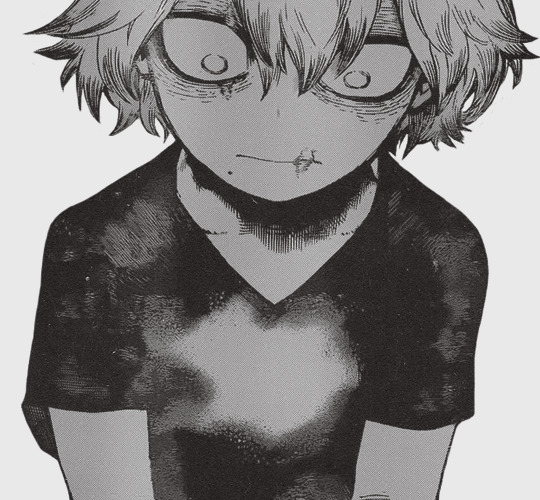
Shigaraki is constantly compared to a child by the other characters around him. Whether it’s the staff at UA calling him a manchild, Ujiko saying he’s a twenty year old brat who has accomplished nothing with his life, or Spinner saying he chases his dreams like a child, Shigaraki’s immaturity and underdeveloped psyche is something constantly commented upon others.
There are two questions to ask now. One, why did Shigaraki turn out this way, and two what does it mean for his character and future growth?
1. An Immature Manchild, A Worthless Twenty-Something, The Trash of Society.
Shigaraki is constantly described by others as acting like a child. In most cases it’s used to insult and demean him, and also to point out his lack of any real tangible goal.




However, Shigaraki’s childish tendencies, his egocentrism, his lack of ability to see the consequences for his actions, and his emotional instability are not a reflection of whether he is a good or bad person, it’s a reflection of his upbringing. This is an important point I want to make before we continu, the hero system uses all of the signs that Shigaraki shows up legitimate mental illness to dehumanize him and make him out to be a “dangerous psycho” rather than to show him any real sympathy.

All Might’s analyses him at length and comes to the conclusion not that this is an unstable person who shows clear signs of mental illness, but rather that the signs of mental illness he shows makes him a bad person. All of these traits that Shigaraki shows are used constantly by his enemies, heroes and villains alike to unperson him.

Once again, Shigaraki acting like a child is not a reflection of whether or not he’s a good or bad person. It’s a product of trauma and his upbringing. Heroes seem to be under the impression that a good person would simply not suffer or react negatively to any trauma. Shigaraki doesn’t grow up not because he doesn’t want to grow up and wants to remain an immature manchild forever, it’s because he was raised deliberately.
Developmental psychology is a scientific approach which aims to explain growth, change and consistency though the lifespan. ... Developmental psychologists study a wide range of theoretical areas, such as biological, social, emotion, and cognitive processes.
Shigaraki was raised in an environment where he could not healthily develop into an adult.
A child’s behaviour is an outward manifestation of inner stability and security. It is a lens through which the family physician can observe the development of the child throughout his or her life. All types of abuse are damaging to children—physically, emotionally, and psychologically—and can cause long-term difficulties with behaviour and mental health development.
Seeing the world from other people’s points of view. Thinking about the consequences of your actions. Processing your emotions and stress in healthy ways. These are all things children learn in the process of growing into adults. However, it’s a learned behavior not a natural one. The idea that people, children, are either born good or bad and will develop based on some internal qualities of goodness or badness is patently false. Children who receive no adult supervision growing up just turn feral and have no ego at all. The ego, or rather identity is something both heavily influenced by the interactions with the adults that raise them and interactions with members of the same peer group.
Shigaraki, raised in a basement with entirely selective and controlled interactions with others that were always underneath AFO’s direct supervision and his thumb, who probably did not even get that much freedom until the UA attack is just barely one step above a feral child who has no adult supervision at all.
These three behaviors:
Lack of Empathy.
Cannot View the Consequences of his Actions
Cannot handle emotions, setbacks and stress
They’re all explainable by specific manipulations that AFO introduced to him as a child. “Shigaraki feels no guilt for what he does” said by almost every hero who interacts with him, but this is completely incorrect. The truth is Shigaraki is constantly made to feel guilty.
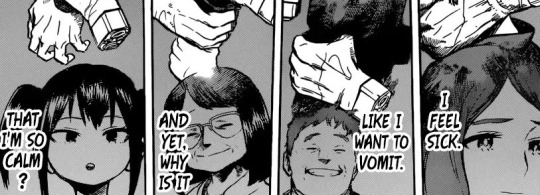

He hates himself, and constantly holds back his quirk because he still feels guilt for what happened to his family due to the accidental activation of his quirk.

He accepts the entirety of the blame for what happened for his family, and therefore views himself as a monster. This is what Shigaraki unconsciously believes and accepts, that he deserves to constantly be punished and tormented without relief for what he did for his family and that he can’t be saved.

These are not the actions of a person who feels no guilt. However, at the same time Shigaraki is seeking some relief from his suffering, he wants to be saved even though he believes he doesn’t deserve it. Therefore, AFO manipulates him into believing he doesn’t have to feel guilty for destroying the people he wants to destroy. This is literally the exact tactic that Chisaki used on Eri.

Tenko is constantly made to feel guilty for what he did to his family, and because of that he’s dependent on what AFO told him would make him feel better. Just like Chisaki convincing Eri that it was her fault that people who tried to save her died made her return to Chisaki.
Shigaraki doesn’t show any emotional maturity because he can’t. Being surrounded by your peers, being in a healthy environment, being taught lessons by the adults around you these are all things you learn growing up. We are shown constant signs that Shigaraki’s childhood was constantly barren. He was raised in a room that was entirely blank.

AFO controlled everything about his life. He didn’t even give him toys or books until he started murdering people, and we see that same room several years later almost completely unchanged from the way it was when he was a kid.
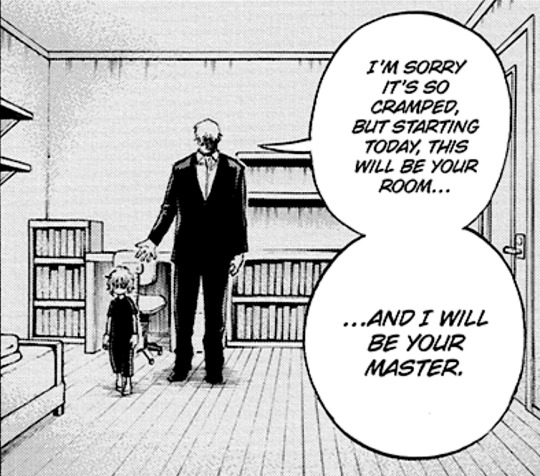


Shigaraki’s entire world was that one room. It’s even remarked that he wasn’t allowed to attend any kind of school.

Shigaraki was raised to have his entire world revolve around AFO’s desires for him. Shigaraki even acknowledges that he doesn’t even really want to accomplish AFO’s dream and knows it won’t satisfy him. It’s something that’s forced down his throat, but also what Shigaraki views as his only path forward. Shigaraki as a person doesn’t exist outside of AFO’s goals for him because he wasn’t raised or nurtured to be a person just a thing that wants destruction.


And, the reason Shigaraki continues to follow down the path set by him by All for One is a rather childish one too. This is once again where Shigaraki’s foiling with Chisaki is illustrative of his character.

This is how Shigaraki reacts when forcibly separated from AFO. Crying and begging like a child ripped away from their parent, completely helpless without him. AFO doesn’t act like a parent at all, but for Shigaraki he’s the closest possible thing. Shigaraki still believes that he owes AFO for saving him all those years back.

Shigaraki and Chisaki are the core of their beings are propelled by this idea that they need to repay their father figures for taking them in. They have this childish desire to make their father figures happy and please them, that’s just as true to their nature as their destructive impulses. So, they act like they were shaped to be. Chisaki acts like the perfect Yakuza member, and Shigaraki as the perfect symbol of destruction. They are both desperately trying to be what their parents want them to be.
Shigaraki can’t handle any setbacks or stress, because he is constantly stressed. He was raised to feel nauseatingly sick of himself all of the time.

Eri can’t act like a normal child because even after removed from Chisaki’s influence, the emotoinal wounds Chisaki left on her don’t magically go away. It’s not about being a good or bad child, it’s about being trapped in a certain unhealthy way of thinking.
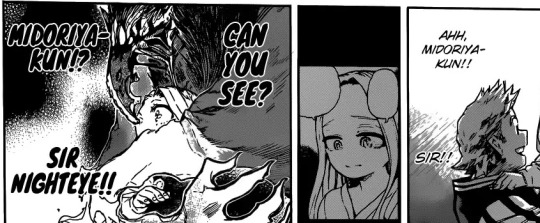
Shigaraki’s not entitled and emotionally immature. He’s emotionally stunted, and deliberately raised that way. If you could say he was raised at all. His captor had no interest in him as a person. He exists to be a pet revenge project against All Might, to turn Shimura Nana’s descendant into an unstable little bomb that explodes and takes out All Might with him.

The person who raised him constantly threw him into danger with no regard for his well being. He expected Stain to try to kill Tomura when they met and stopped Kurogiri for interfereing for his safety. He expected All Might to beat the shit out of him and for the UA attack to fail. This goes back all the way to the beginning.

He exposed Shigaraki to dangerous people who would beat him up, insult him, and belittle him. People that deliberately reminded Shigaraki of his abuser.

So he would be constantly made to feel unsafe and unstable. Shigaraki has no emotional stability because he was constantly raised in an unstable environment, it’s not hard to remain sane in that environment, it’s downright impossible.
2. Children can Grow Up

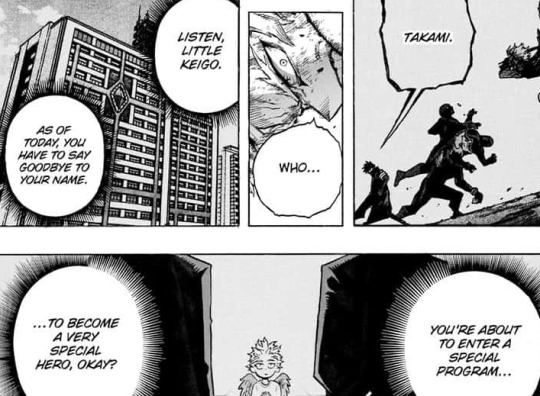

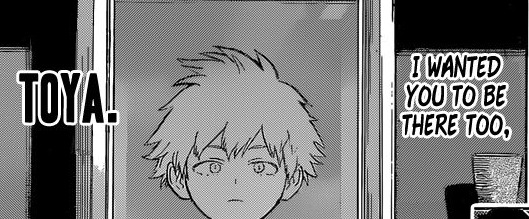
This is a theme we’ve seen repeat itself three times. A child is murdered and has their name taken away by their paternal abusers, and they make it into adulthood (despite symbolically dying as a child) with entirely different names and identities. Takami Keigo grows up into Hawks, Touya grows up into Dabi, Shimura becomes Shigaraki. However, all three of them as adults are malformed and still clinging onto the hurt feelings that they held as a child. Shigaraki and Dabi literally both look like corpses, and Hawks has literally no personality or name outside of being a hero.
It’s not a reflection of who they are as people, it’s a reflection that they were not raised to be people. However, Shigaraki is constantly remarked on as a child capable of growing up.
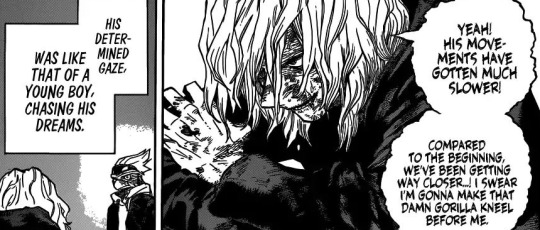
Spinner, Shigaraki’s friend sees the good side of his childishness. He is someone who late in life, is still learning and developing empathy. We see him change over the course of the story. Shigaraki who claims that he doesn’t care about anything besides destruction, also specifically states that he won’t destroy his companions hopes and dreams.
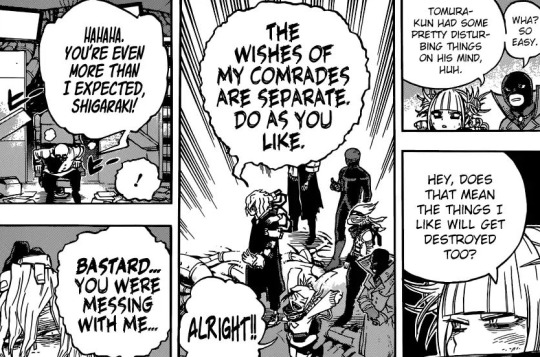
Shigaraki who is presented as a person who is entirely devoid of empathy, is shown being able to deal with somebody like Twice perfectly. Not only does he listen to Twice’s demands that they rescue Giran.
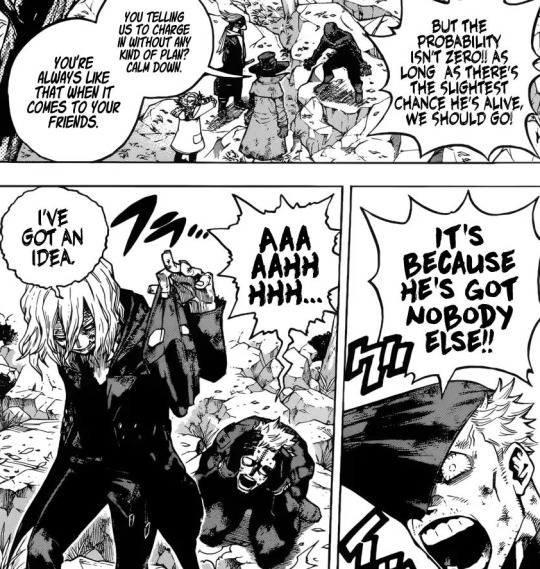
He also knows how to make Twice listen, and then carefully places his mask back on again to calm him down afterwards. He deals with him like a person and is accomodating of his quirks.

Shigaraki makes it deliberately a point that he’s not okay with someone else playing around with Twice’s feelings.

He also tells Twice to make saving Giran and protecting him a priority when he plans on finishing Rikiya himself.

All of this consideration for the feelings of an individual. Shigaraki’s empathy has grown and developed to the point where he can imagine the feelings of other people outside himself. Now compare this to the way Hawks deals with Twice. Shigaraki finds trampling all over the feelings of Twice as unforgivable, whereas Hawks brags to Twice’s face how easy it was to deceive him. He belittles him and rubs salt in the wound.

Hawks can only accept Twice as a good person. It’s Shigaraki who gives a home to those who have no other home, the outcasts, the bad people that heroes would never save.

Shigaraki who understood how important Twice’s feelings for his friends are, built his entire plan against the MLA around saving Giran, and Twice’s own desires to want to help his friend Giran and pay him back for giving him a place to belong. Hawks literally goes out of his way to single out Twice as the only one he can save and not extend the same helping hand to his friends. Shigaraki recognizes Twice’s feelings for his friends, Hawks goes out of his way to trample on the friends that Twice finds so precious.
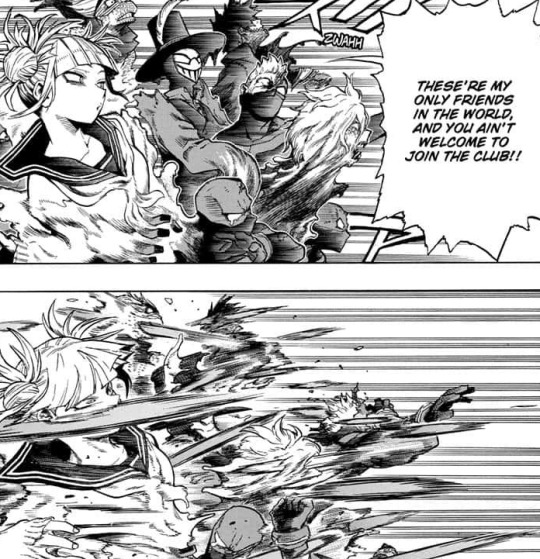
Hawks wants to save Twice but doesn’t understand him as a person. Shigaraki has created a place where people like Spinner, Toga, Compress, Twice, Dabi are all accepted and valued as people. Shigaraki’s childishness is both a good and bad thing. It shows that even after all of this trauma, the core of who Shigaraki is has not changed.

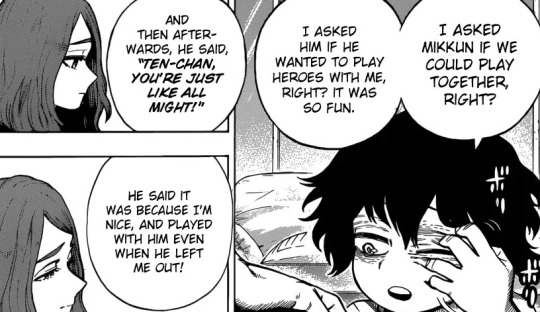
He is still the kid who deliberately plays with the kids on the playground who get left out. Who states that he specifically wants to be a hero because there were kids who were left out of being played. And who wanted to be a hero even when he knew his father would severely disapprove of it and kept that dream in his heart.
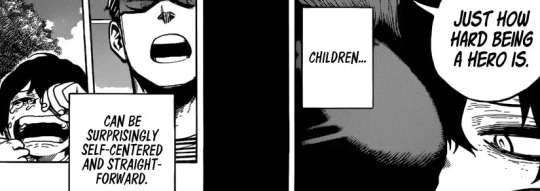
Shigaraki is still Shimura Tenko. He’s not the child who wanted to be a hero, or the child who wanted to destroy to make the pain go away, he’s both at the same time and that’s where his complexity comes from. Shigaraki like anybody else is capable of good and bad, but what’s especially important about his arc is that we’ve been shown that when removed from underneath the thumb of his abusers, and surroudned by his found family in the league Shigaraki gets better and is able to begin seeing the emotions and feelings of other people outside of him, and becomes a more empathic person. He is a child yes, but also a child capable of growing up.
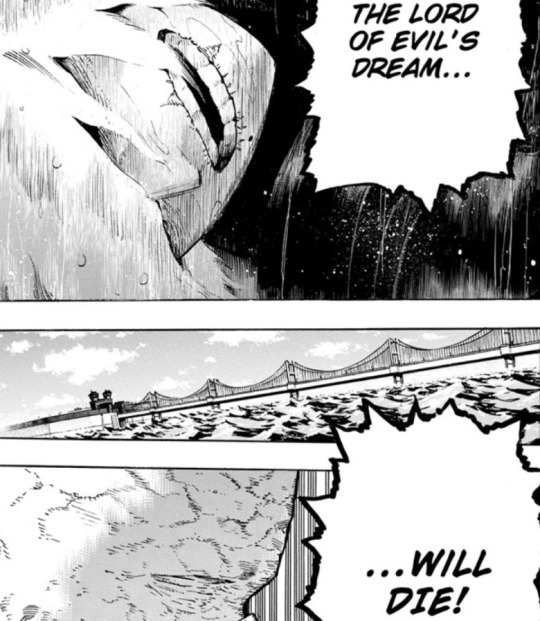
It’s also important to remember his arc. When Shigaraki is fighting for the league he always succeeds (against the Yakuza, against MLA). He only ever fails, and relapses (such as his current failure in the hero war arc raid) when he believes that he has to follow the dream laid out for him by AFO. It’s almost as if Shigaraki was intended from the start to shake off AFO’s influence of him and eventually grow into his own person. Shigaraki is a child waiting to grow up, he’s still Shimura Tenko, and he should be allowed that chance to grow past his abuse. He might never become a hero but by the end of the story he deserves to be his own person, not AFO’s thing.
#shigaraki tomura#shimura tenko#afo#all for one#lov meta#league of villain meta#shigaraki meta#my hero academia meta#my hero acaemia theory#mha meta#my hero academia#league of villains
764 notes
·
View notes
Text
Wagnerrant Review #6 - Tristan und Isolde
Work: Tristan und Isolde Bayerische Staatsoper Date of performance: 31.07.202
Team Director: Krzysztof Warlikowski Conductor: Kirill Petrenko With: Jonas Kaufmann, Anja Harteros, Okka von der Damerau, Wolfgang Koch, Mika Kares, Manuel Günther, Dean Power, Christian Rieger
Review: @beckmessering
Here’s an entirely hypothetical question: when not very familiar with an opera, is a Regietheater production with hotly anticipated role debuts the best opportunity to form an emotional understanding? Answers may vary, but take it from a someone whose opera education had a shamefully large Tristan-shaped hole: Krzysztof Warlikowski’s Tristan und Isolde at Bayerische Staatsoper is a production to to gnaw on – conceptually elusive and a puzzle with many pieces, but finally a great reward in scenery and in music.
Jonas Kaufmann lends Tristan his well-known baritonal timbre, although it’s not quite as prominent as usual. His voice is dense and rich, though not artificially darkened, and brings delicate piani as well as strength to the role. The third act with Tristan’s near-incessant monologues of increasing volume and intensity provide an audible challenge that doesn’t leave Kaufmann’s voice untouched: he sounds somewhat taxed by the time he’s finally allowed to collapse once and for all. Granted, it’s a punishing and brutal feat; the sheer amount of energy required to sing oneself to death likely isn’t equivalent to the amount a badly wounded man would still have. Kaufmann thus doesn’t quite look to be on death’s door despite a shirt soaked in progressively darker shades of red, but he nonetheless he provides a well-grounded interpretation of one titular character. He steers away from classic hero territory into something more nuanced and disconcerting if one only looks closely enough – Isolde, for that matter, hits the nail on the head when she replies “Frag deine Furcht!” to his “Und welchen Feind?”. He’s scared – or perhaps haunted by thoughts that won’t leave him alone, unable to keep his hands and his gaze still when not singing. He doesn’t outright long for death, but from the very start, he sure doesn’t seem at ease with life, either. Something isn’t quite right with Tristan – and just the right person is needed to unleash it fully.
That just-right-person is Anja Harteros as Isolde, who deserves perhaps the audience’s grandest ovation. Vocally, she is still in excellent shape until the last measures of her delicately sung Liebestod, having preserved her gleaming heights and pristine sound over all three acts. Her middle register, uniquely crystalline and incredibly poignant, could conceivably serve to distinguish her voice from thousands. Yet her singing by far isn’t too pretty to show feelings – Harteros’ voice suits a seething young woman with a rich inner life that progressively unfolds throughout the opera. “Lass’ uns Sühne trinken!“ is an actual threat, one that Tristan wholeheartedly embraces. After losing herself in love in the second act, she reemerges from it lonely and bitingly aware of it. Her grief, like her rage, is controlled yet bone-deep, and it inevitably leads her to die. Perhaps something wasn’t quite right with Isolde, too.
Wolfgang Koch sings Kurwenal with a vivacious, robust baritone that energetically prizes life – a great contrast to Tristan’s inclinations. However, Koch stays far from acting clownish, particularly in the third act, where he wears the worry about his friend on his sleeve, but ultimately remains powerless against Tristan’s impending death. While the latter ecstatically sings himself into delirium, Koch remains comparatively static, demonstrating his character’s inability to help and by extension, vastly different attitude towards life.
Okka von der Damerau’s Brangäne is a well-meaning figure trying her best to put Isolde at ease in this admittedly highly tense situation. While initially reminiscent of a caring aunt, the two women’s bond becomes far more sisterly in nature once the first act’s dialogue – or perhaps conspiracy – around Isolde’s secret potion stash unfolds. She braves the act’s finale with top notes of impressive volume and provides a surprisingly bright, silvery metallic sound for a mezzo. Considering the standout dynamic between the two women, it’s perhaps fitting that her voice blends so smoothly with Isolde’s and even elicits comparisons to a soprano’s sound.
Mika Kares as King Marke packs much disappointment into his clear, well-articulated bass, though it’s about far more than the good old besmirching of honour – this betrayal is personal to him and runs deep. Regrettably, he’s given little to do once he has discovered the wrongdoers in each other’s arms except stalk back and forth between Tristan and Isolde, so he resorts to various pronounced eye movements that verge on accidentally amusing. Brangäne’s single look of horror upon assessing the scene says more than any eye movement could.
Kirill Petrenko’s conducting is fluid, gentle, a statement in and of itself never at the cost of the singers. He crafts the prelude into an intensely lyrical treat, promising much and delivering on that by keeping the orchestra’s sound light yet rich enough to satisfy. He eschews heaviness, but never at the expense of intensity. Particularly the tense moments of the first act are played out very well, and the performance is audibly a successful collaboration between singers, conductor and orchestra: the singers are never drowned out, the orchestra makes its mark, and Petrenko himself brings both together with excellent timing to savour a spectrum of emotions.
Director Krzysztof Warlikowski transplants the setting into a wood-panelled room with high ceilings that traps all characters within its high ceiling, allowing them little escape from what troubles them. This room serves as a continuous backdrop throughout all three acts, although each act adds elements uniquely suited to the current happenings. During the prelude, two silent dancers dressed as almost frighteningly life-like dolls, one male and one female, appear. Their movements are tentative, childlike, evocative of a fragile state as they interact and cautiously touch each other. In the second act, a projection that previously illustrated the view outside a ship’s porthole serves as perhaps an emotional window into the lovers’ psyche. It shows grainy, black-and-white footage of Isolde sitting – waiting – alone on a bed, suggestive of a security camera’s spying eye. In the film, Tristan enters only during “O sink hernieder” and the two sit silently next to each other sans any eye contact, while the real-life Tristan of course has of course entered the stage some time ago. While both of these elements receive their resolution in the final act, the act two film is already subtly reflective of the singers’ actions onstage. While the first act was far more dynamic in terms of interaction, much of this movement disappeared once Tristan and Isolde fell in love, causing the lovers to remain comparatively static during their time together. This takes some time to notice and even more time to get used to, but it allows for much inference on the nature of this love. It’s of the paralysing sort, and it can’t coexist with normal life and regular interaction. There is wallowing in this love or interacting with the rest of the world – but ultimately, a choice will be have to be made. It’s a consuming love, yet clearly not of the physical or even romantic sort, judging from the frequent lack of touch and eye contact – perhaps it’s more of a kinship, a matter of two people having found a part of themselves in each other that they had lost. In any case, the concept avoids the stylisation of Tristan and Isolde’s love as something bright or pure – they may be enraptured, but their state of intoxication doesn’t induce wishful thinking in the audience. The music, more than anything else, connects the lovers with the onlookers. It’s a maddeningly subtle concept of interaction that can easily be taken as stiff or confused with lack of ideas, and the only time it doesn’t pay off is during King Marke’s confrontation in the second act, where Mika Kares isn’t given enough space to physically communicate the emotions of the normal world.
The place of Tristan’s youth in the third act finally unites the previously introduced ideas: Tristan awakes at a table surrounded by dolls seated at a dinner table and dressed like the one representing him in the prelude. As he recalls the early death of his parents, the suggestion that he grew up in a boarding-school atmosphere and carried the burden of being orphaned plants the core idea that he comes from a place of loneliness. Absent a place of emotional safety and affection, his outlook on life is shaped by the inner fragility and unsteadiness he was instead endowed with, and causes him to escape into a love – or a construct – that opposes this life. The question of whether his love is static and at odds with life by nature or rather by Tristan’s nature remains somewhat open, but both are conceivable. During Isolde’s Liebestod, the projections return, showing the lovers lying side by side on the bed again while the room floods with water. As the two inevitably drown, they gaze into each other’s eyes for the first time while the film turns colourful. What initially seems oddly romanticising of death and clichefully pleasant becomes exceptionally poignant when seen as the lovers’ attitude towards death and final fulfilment rather than the director’s views.
It’s an interpretation that becomes more wrenching the longer one thinks about it – multi-layered, elusive, and it refreshingly strays from unduly heroic characterisations that don’t fit the story well. Admittedly, the focus is somewhat aimed at Tristan, and by necessity of the set, much of the psychologization of Isolde in the first act has to occur in the same setting Tristan’s mind will eventually be dissected in. Partially bound by the story and partially by the staging, she can’t be given the same due, which, considering Harteros’ standout Isolde, is a slight shame. Nonetheless, the production doesn’t feel uneven, and when adding music and singers, it becomes a harmonising whole entity. I myself may have closed my eyes in an attempt to fall in love, and I don’t see anything more befitting this opera.
9 notes
·
View notes
Text
the old guard: loneliness, connection and immortality
APPARENTLY I am writing a thing about The Old Guard today.
(Bear in mind that I haven’t read the graphic novel, although I’m eager to now, so this is solely based on the movie and some things I’ve read about the comic in articles about the movie.)
Under the cut for spoilers, although the discussion is fairly general.
The Old Guard is an interesting take on immortality for a whole bunch of reasons. The immortals aren’t invulnerable. They feel pain; they can be injured and experience dying. They just know they’ll come back. (Until they don’t, which is another interesting twist.) They have super-fast healing and regenerative powers, but they don’t really have any other superpowers, so they still experience all the needs and vulnerabilities of regular humans. Which is a very interesting twist, and made me realize just how often I’d seen fast healing paired with super strength or other superpowers. But these characters, other than not being able to die, are basically just humans with a lot of combat experience--hundreds or thousands of years’ worth. This might make them more skilled than most mortal humans, but in a fight they don’t have any advantages of superhuman strength or speed, which makes the fights feel a lot more interesting and grounded than your standard superhero fare. (I love that the older immortals all fight with bladed weapons as well as guns, and in some cases prefer them, because they’ve been using those weapons way longer than guns, but writing about the action style in The Old Guard is a whole other post.)
A lot of the things The Old Guard is meditating on are about the price of immortality--about watching the whole sweep of human history and not knowing if anything you’re doing has had meaning, in terms of making the world a better place. It manages to be a lot more existentially melancholy than your standard mainstream superhero fare, but without slipping into completely dour grimdark territory, and I think a lot of that has to do with how much it has to say about human connection and loneliness.
There’s the inherent isolation of immortality: any mortal you have a relationship with will eventually realize that you’re not aging, and every time, you know they will eventually grow old and die, while you will not. There’s the isolation of keeping your secret, since the film makes clear the many ways immortality can get you in trouble. And there’s the psychological isolation of just knowing you will live your life on a profoundly different time scale than everyone else around you.
In this context, the few connections that are possible, with other immortals, become desperately important. (They literally dream of each other, even before they know each other’s identities, and even when physically separated for a long time.)
When death is off the table as an option, it’s clear that isolation is the worst punishment an immortal can face. “She was alone for a long time,” another character says of Andy, and it’s clear that that was terrible. Quynh’s fate (alone, trapped, and suffering indefinitely) is a horrific extreme version of this, and it’s clear Andy still feels guilty, hundreds of years later, that she stopped looking for her. Dying together, even painfully, is something they can have a dark laugh about, but being separated is a trauma that haunts the whole group.
It’s notable to me that of all the immortals, Nicky and Joe are the ones who seem most well-adjusted and at peace with their relationship to life, death and humanity. Still in love after something like 900 years, they can banter about relaxing in Malta even while held prisoner in a medical lab, with a confidence in their shared future that doesn’t feel fake. (And boy am I glad the narrative reinforces that confidence.) And it’s notable that in the heat of the moment, none of them is willing to leave Booker behind in the lab, even though he betrayed them and led them into the one thing they’ve said they try to avoid at all costs, captivity. Even Booker’s betrayal comes from a desire to make them less alone, although he certainly picked the absolute worst way to go about it.
Nile’s arc is all about her integration into her new found family of immortals--even more, I think, than it’s about realizing and gaining mastery over her superpower, in the way that most superhero origin stories are. She is given the choice to leave, and chooses to go back because she thinks Andy, specifically, might be in danger. (The whole arc of her relationship with Andy is great and deserves its own post.) But it’s clear that severing her ties with her biological family is painful to her; the other immortals understand this, and the narrative doesn’t treat it lightly. Booker’s loss of his children; Copley’s loss of his wife (which is planted in literally the first scene we see him in)--family and human connection are all over the motives of protagonists and antagonists alike. (Even Merrick--it’s his obsession with profit over human life that distinguishes him as the narrative’s true villain and makes other characters turn against him.)
Given all this, Booker’s punishment at the end of the film seems particularly cruel and like the kind of narrative device set up to backfire. It seems obvious that the final scene is setting up Booker and Quynh as the antagonists of a sequel, which I hope we get to see. Booker is wounded and not handling it well; Quynh, I’d imagine, has an extremely understandable desire for some revenge. Given how much we know of their backstories, they could make an extremely sympathetic pair of antagonists.
I don’t know what a potential sequel would bring and if/how it might diverge from the plot of the comic. But what I would love to see is some ending that re-integrates Quynh and Booker into the family (and probably unites them against some new threat in part 3; it’s purportedly a trilogy). It’s the only ending I can think of that wouldn’t be unimaginably cruel to both Quynh and Andy. Even if they’re never explicitly portrayed as being romantically involved (although...I would certainly not complain if they were), I really want to see a resolution to their relationship arc that doesn’t leave them as the unspoken tragic parallel to Nicky and Joe, and doesn’t involve one of them killing the other. It seems like this would be the most thematically resonant option too. I suppose one can hope. (And if not, that’s what fic is for.)
#the old guard#spoilers#Charlize Theron#found family#human connection#look it should be WILDLY clear by now that stories about people finding connection after a long period of loneliness#are basically my kryptonite#so of course this one was going to get me#i have a LOT of questions about the details of the worldbuilding in this show#but it got things right in the feels department
204 notes
·
View notes
Note
random thought, but what if the party had been in the entity's realm? i dunno, seeing el just yeet palettes at killers would be a sight though kjdshkjs
i did this whole speech about how i can’t deal with kid characters in dbd so have some of the adult cast instead! i’m sorry it’s not what you wanted but i hope it’s ok <3 also let’s imagine them joining separately or this won’t make much sense. spoilers for st season 3!
Stranger Things characters as dbd survivors
Jonathan
So many tears from both sides when he reunites with Nancy. She's heartbroken that he's stuck here now too, but is also really happy to be with him.
Jonathan doesn't care about being trapped for potentially eternity. He’d literally do anything to be with her, and he would have come voluntarily.
Leans his forehead against a crying Nancy’s, smiles and murmurs “What’s one more shared trauma?” while Nancy chokes out a laugh through her tears.
They're disgustingly adorable at camp, constantly sharing soft looks and smiles and inside jokes.
Nancy will need lots of reassuring that Jonathan’s mom and brother will be okay without him, and that her own family is coping.
With Jonathan around, Nancy starts coming out of her shell more. She gets a lot of her fire back, determined to find a way out and rebel against the Entity.
Jonathan and Steve quickly become friends, as they were on good terms even before, but Jonathan is so grateful Steve has been there for Nancy. Steve is just glad to have a familiar face and is super happy for them.
Would probably bond with Jake because they're both pretty damn weird. Also Claudette and Adam, being the more quiet types, and Zarina for the photography.
Robin
Fucking screaming when her and Steve see each other at the campfire. “Dingus! Where the fuck have you been!?”
When she's given the ‘welcome to the fog’ talk by Dwight, her smile fades. “You're kidding,” she says, eyes wide, before turning to Steve. “Please tell me he's kidding.” “Sorry,” Steve cringes.
Is surprisingly quick to embrace the situation, following Steve’s lead in dealing with the situation with humor. Steve gets even more dorky and hyper than before, happy to have his partner in crime back.
Imagine Steve and Robin, full scoops outfits, bullying the shit out of killers.
She vibes with Nea and Feng who totally teach her all their toxic little tricks. She also finally gets to properly know Nancy, and they become fast friends as they have a lot in common and Nancy loves hearing about what happened in Hawkins after they were taken.
A lot of the other survivors mistake Robin and Steve for a couple, right up until Robin gets visibly flustered by a bear hug from Kate. She secretly also ends up crushing hard on Claudette, but doesn’t tell a soul, not even Steve.
That doesn’t stop her from bugging Steve about whether he has a crush and to let her wingwoman for him.
Once starts talking to Anna in Russian and nearly gets adopted and starved to death, but is luckily saved by Bill forcefully pushing her out through the exit
When she gets overwhelmed by the death and violence, Steve sneaks her away and lets her cry on his shoulder. Other times she tells stories of Dustin and the other kids, who looked for Steve and Nancy every day for months, and pets his hair while he quietly sobs into his Scoops hat.
Joyce
Steve and Nancy couldn’t be more confused upon seeing Joyce. “Mrs. Byers? What are you doing here?”
She's worried about her boys but quickly pulls herself together. Reassures Nancy that Jonathan is safe and free from Hawkins drama, though he’s never been able to get over Nancy after her disappearance.
“What about the kids? Are they okay?” mama bear Steve butts in. He smiles brightly every time she tells him stories about the kids’ adventures he’s missed.
She's a resourceful lady and does quite well in the trials. Hates most killers but is still furious with Demo for kidnapping her boy. Even David looks a little intimidated by her unbridled rage when she’s up against the killer, slamming pallets on its head and chasing it down when it tries to whimper away.
Will scold Legion like a disappointed mother. “What are you doing, boy? Is this what your parents would have wanted?” Joey actually pauses mid-frenzy, knife raised, before lowering the weapon and shuffling his feet in shame. “Sorry, ma'am.”
She's a good addition to the survivor camp, as they’ve never had a literal mom figure before. Laurie especially really looks up to her, and Meg loves her no-nonsense attitude. Joyce looks after the younger survivors and is on pretty good terms with everyone.
Well. With the exception of Ace. Upon first meeting him, she slaps him when he goes in for a cheesy kiss on her hand. “I was just told I’m stuck in an endless cycle of murder and violence—do you really think that's appropriate?” she scolds while Ace just grins.
Out of everyone, she’s the most determined to find a way out, inspiring a lot of the others with new hope.
Hopper
He's very confused and angry about the realm, even after Steve and Nancy explain everything. At this point he’s seen so much weirdness he’s just done with all the paranormal bullshit.
Just wants to go back to El and feels like her and the kids and the entire goddamn town of Hawkins need him.
Sucks in trials at first. “So let me get this straight... I have to repair machines and run circles around a piece of wood while a murdered is after me?” “Pretty much, yeah,” Steve shrugs. “Right, not happening. My gun has to be around here somewhere!”
Instant bros with Tapp because good cop and… good cop? Tapp is able to get through his thick skull with strategic advice, and they’re both very much about protecting the other survivors.
Fits in well with the rest of the Old Man Squad (TM) as well, even though Ash keeps trying to one-up his stories, Bill refuses to share his cigarettes, Felix constantly talks about weird future stuff, and Ace always teases him about his shit poker face.
He’s instantly very protective of Steve and Nancy and easily adopts Cheryl, Nea, Quentin, Laurie, Feng, Meg—the list goes on.
Billy
He did slightly redeem himself just before his death, but is still hesitant to join the group, thinking Steve and Nancy hate him after all the shit he put them and their friends through.
Nancy is wary but Steve is quick to forgive and forget. “Just don’t kick my ass or, y’know, try to kill us again, yeah?” Steve laughs a little shakily and, knowing Steve had more beef with him than her, Nancy follows his lead and eventually comes around.
Has a lot of banter with David, and nobody can really tell if they're best bros, hate each other's guts or have the hots for one another. The Entity gives him a shirtless skin too and they can usually be seen obnoxiously flaunting their abs together.
A lot of the others make fun of his hair and pretty boy look. Luckily he can take it in stride, dishing out just as much cheeky comments about Feng’s neon hair and some of Ace’s more questionable outfits.
Tries to hit on Jane because he's a thirsty fuck but gets a very patronizing “Talk to me in a decade, honey,” for his efforts.
Eventually opens up to Nancy that it's not fair for her and Steve to be stuck here, as they didn't do anything wrong. He thinks he deserves the punishment, and is surprised the Entity didn’t make him a killer after what he did.
He’s still a cocky little shit, though much more genuine than before—dying probably has that effect on you.
*cries* i’m so happy i got to write jancy i love them so much ;w; also i would 110% ship joyce and ace but i doubt anyone is surprised
#dbd headcanons#stranger things#jonathan byers#robin buckley#joyce byers#jim hopper#billy hargrove#steve harrington#nancy wheeler#dbd survivor#jancy#dbd#dead by daylight#request#dweetwrites
66 notes
·
View notes
Text
Break the Wheel
It’s a common point of discussion in the Kingdom Hearts fandom how often the main heroes are screwed over by the actions and attitudes of their various mentors. Ansem the Wise, Eraqus, the Master of Masters... Nearly every mentor figure in the series has contributed in some way to the pain the young people they interact with have endured over the course of the series.
The Master of Masters deliberately manipulated his pupils into turning against each other and starting a war to further his own agenda. The Foretellers spread that suspicion and mistrust of each other outward to the members of their respective Unions. From what we’re seeing so far, the Dandelions are removed from the Master’s direct influence and are handling the Potential Traitor discussion so much better than the Foretellers did in Back Cover, but something still clearly went wrong that left at least four of them thousands of years in the future with only vague memories of their past at best.
Birth by Sleep showed how Eraqus’ paranoia and distrust of darkness directly lead to the suffering of his pupils. His attitude toward Terra’s darkness in the beginning drove the latter to seek validation from Xehanort, who used Terra for his own agenda causing Aqua to trap herself in the Realm of Darkness to save her friend. Eraqus’ insistence that she spy on Terra and bring Ven back to the Land of Departure drove a wedge between the trio at Radiant Garden. And his willingness to kill Ventus to stop Xehanort leads to his duel with Terra and subsequent death.
Ienzo’s role in the experiments performed by the Organization’s founders prior to the fall of Radiant Garden is unclear, but his conversation with Ansem in Kingdom Hearts III suggests that the older apprentices kept him in the dark about many things and might have potentially used Ansem’s fondness for him to manipulate their mentor. This resulted in Ansem’s banishment and - if DDD is any indication - turning Ienzo into a Nobody against his will when he was only 8 years old.
Ansem himself went on to openly seek the destruction of Roxas, Xion, and Namine for the sake of his revenge against everyone who wronged him, using his prejudice against Nobodies to justify the things he did in pursuit of his goals. And despite guiding Riku to accept his own darkness in Chain of Memories, Ansem still fundamentally buys into the view of Darkness as something inherently negative, best illustrated at the end of Riku’s side of that game where DiZ attempted to make Riku choose between the “road to light” and “road to darkness”, implicitly trying to force Riku into a rigid either/or path that Riku rejects in favor of choosing “the middle road”.
This pattern has repeated often enough that when fans on Twitter shared screenshots of Dark Road from the game’s prematurely leaked website showing Master Odin, several fans - myself included - began eagerly anticipating the ways in which this pattern of old men failing the young would rear its head in Xehanort’s time as an apprentice.
The fact that this pattern appears so consistently across the entire Kingdom Hearts timeline is not an accident. The entire starting point of the Heroine’s Journey is built around the idea that the protagonist’s environment - parents, mentors, peers, sometimes even their entire society - has failed them in some way[1]. By forcing them to adhere to a rigid binary of what traits are considered desirable versus undesirable, it forces people who do not fit those standards to cut themselves off from vital parts of who they are in order to be recognized and validated.
So when the younger generation grows up with these standards and is called to fix the mistakes of their elders, they are expected to do so on their mentors’ terms[2]. In doing so, they will ultimately continue the cycle that led to those problems in the first place. But the central protagonist of the Heroine’s Journey is different. The qualities which set them apart are the same ones that allow them to think outside of this rigid binary and ultimately break that cycle. In the course of their growth, the main character learns to create a new, better world not by vanquishing a villain who represents the failures of the old one, but by healing the wounds those failures created.
Kairi said it best in Kingdom Hearts III that Sora’s journey is about helping people, many of whom he’s never met before. This is significant because the protagonist breaking out of the cycle has commonly taken the form of learning to solve problems with compassion and understanding instead of violence and punishment[1]. The main character cannot improve the world around them by simply killing the villain and calling it a day. In order to achieve meaningful change they need to help the people who have been hurt by this rigid cycle. And as the contrast between Sora’s attitudes towards the dying Organization members in Kingdom Hearts II and III demonstrates, that includes the same villains he’s fighting against. Yes, even Xehanort.
Because when you look back and think about it, every non-Disney antagonist in the Kingdom Hearts series is shown to be motivated by the pain and/or trauma inflicted on them by the worldview of their peers and mentors, which they then took out on the people around them.
Marluxia as Lauriam was powerless to stop Strelitzia’s murder, and then he lost all memory of his past when he arrived in the present from the Age of Fairy Tales. That knowledge casts his behavior in Chain of Memories as someone trying to control the people around him as a proxy to feel like he has control over his own life[3].
Ienzo’s words when Ansem returns in Kingdom Hearts III[4] and the fact that he was a child [5] when Radiant Garden fell[6] paint his words toward Riku in Chain of Memories about the latter destroying his home as Zexion projecting the repressed guilt over the destruction of his home onto Riku.
Saix’s cruelty toward Roxas and Xion in 358/2 Days is revealed in Kingdom Hearts III to have been driven by jealousy towards Axel and the feeling that he was being abandoned and replaced[7].
All of these characters’ villainous actions can be traced back to the influence of the mentor figures of their generation. Marluxia’s survivor’s guilt over Strelitzia’s death is the result of her killer attempting to defy the manipulations of the Master of Masters. Saix was gaslit about his own humanity by Xemnas and Xigbar for over a decade with Xemnas’ manipulation and whatever effect Norting had on him on top of that. Ienzo’s conversation with Ansem in Kingdom Hearts III indicates that he didn’t fully understand what Ansem’s adult apprentices were doing around him when they were conducting their experiments, and the flashback at the start of Dream Drop Distance suggests he had not become a Nobody of his own volition.
Xehanort too, is someone who was hurt by this destructive cycle. The things he indicates he saw during his world tour - people refusing to acknowledge the darkness in their own hearts and allowing it to grow [8] - showed him the consequences of repressing one’s darkness and negative emotions as he and Eraqus were taught. He wanted to change this, but he was still so entrenched in that system that the best he could think of ultimately amounted to the same rigid viewpoint but flipped so that darkness was on top.
The merciless death many fans felt Xehanort deserved would only reinforce the “darkness evil, light good” worldview that Riku’s redemption arc was built on overturning. In order to truly heal the wounds created by the rigid belief system that made the villain who they are, the protagonist needs to be able to extend their compassion and sympathy even to their greatest enemies, or else it fundamentally breaks the narrative. The idea that there should be limits or conditions on such compassion is exactly the kind of mentality that led Eraqus to try and kill Terra and Ventus in Birth by Sleep. It doesn’t mean the main characters will ever forgive the villain(s) for what they’ve done, but that they are choosing to let go. To focus their energy on self-care and rebuilding, instead of more violence and more destruction[2].
Regardless of how individual fans feel about it, Xehanort being treated with dignity in his final moments needed to happen in order to show Sora’s growth. If Kingdom Hearts III had given Xehanort a violent demise like some of us wanted, it would have been a betrayal of the Heroine’s Journey’s major themes. Treating opponents with sympathy and compassion is a critical element of the framework, and is necessary in order to allow the protagonist to break free of the destructive mentality that created the story’s overarching conflict in the first place.
Sources:
[1] “The Heroine with a Thousand Faces”; June 13, 2019;
https://www.teampurplelion.com/heroine-with-a-thousand-faces/
[2] “On Love and Lions Part 1: An Analysis of Love in VLD”; February 14, 2020. https://www.teampurplelion.com/on-love-and-lions-1/
[3] Analysis of Marluxia by @mlhelena; https://mlhelena.tumblr.com/post/185211447430/thought-that-ive-been-nursing-for-a-while
[4] Kingdom Hearts III. Square Enix, 2019.
[5] Kingdom Hearts: Birth by Sleep. Square Enix, 2010.
[6] Kingdom Hearts 3D: Dream Drop Distance. Square Enix, 2012.
[7] Concerning Atypical Heart Regrowth in Nobodies: Saïx Case Study by dicax; June 23, 2019.
https://archiveofourown.org/works/19329115
[8] Kingdom Hearts III Re:Mind. Square Enix, 2020.
52 notes
·
View notes
Note
Ranking Brotherhood of Evil Mutant members (including all interations) from your, most to least favorite and please expound why. I do like asking for opinions.
Hmmm....there have been several iterations of the Brotherhood, and I’m not very familiar with some of the later versions, so I’m just gonna go with the earlier versions that I know. Bear in mind, this is entirely subjective, and I like most of these characters, so a character being lower down doesn’t mean I hate them. Going from favorite to least favorite:
Pyro:
Anyone following this blog has probably noticed I love this dude. I’m not exactly subtle about it. I think he’s interesting and fun, as villains go. He’s snarky and cocky, and actually rather friendly when he’s not trying to kill you - very Affable Evil. He’s not necessarily a very good person - he’s self-interested, and can be rather vicious, but he’s a character that I thought could potentially come over to the good side. He seemed, at times, to get into the whole “Freedom Force” thing, and clearly enjoyed saving people alongside Longshot. He seems to bond a great deal with his team-mates - Mystique, Avalanche, even Stonewall (although he was a dick to him and Commando when they first joined). He even pals around with Blob, even though he also snarks at him sometimes. In AOA, Pyro was the only one helping and being protective of Phantazia. And now in Marauders he refers to them as his “friends,” and is perfectly happy traveling around with people that used to kick his ass, even appearing impressed with them (especially Storm), and being a surprisingly good team player. I don’t think Pyro would necessarily become a good guy for altruistic purposes, but I think he enjoys having “adventures” and getting attention and hanging out with his team-mates. I think if Pyro was on an X-Team, and was made to feel welcome, he’d probably be content to fight alongside them and follow the rules (which is basically what he’s doing right now with the Marauders), and maybe some of his team-mates’ virtues would rub off on him a bit. (There was apparently a version of X-Factor pitched to Marvel years ago that included Pyro on the team, and I’m disappointed that never happened, although I loved the X-Factor that we got.) And of course, there was also Pyro’s somewhat redemptive death, where he came to regret his past actions with the Brotherhood and wound up sacrificing his life to save Senator Kelly (fat lot of good it did, since Kelly got assassinated shortly after, but hey, he tried!)
Along with all of that, I am also really intrigued by Pyro’s back story of being a romance author and journalist. There’s the whole dichotomy of a guy who callously burns people to death and also writes gothic romance novels in his spare time. And honestly, it sounds like he’s lived a really interesting life before the Brotherhood - traveling all around South East Asia, working as a journalist covering Indonesia and Vietnam (I’d assume he speaks at least a little bit of Indonesian and Vietnamese to be able to live there and cover news). His motives for joining the Brotherhood have never been established, and I’m dying to know more about how he met Mystique, and why he decided to leave what was apparently a successful career and probably fairly comfortable life to go be an international terrorist. Was it money? A promise of adventure? Did he really believe in Magneto’s cause? Was he already getting into criminal activity before he joined the Brotherhood? There’s a lot of potential for development there, but unfortunately most writers (except Claremont) tend to completely ignore all of Pyro’s backstory. I’m still hoping that Duggan at least makes some reference to it, even just a throwaway comment about how Pyro used to write novels.
TL,DR: I like Pyro because he’s fun and clever, he makes friends with his team-mates, and he’s a writer.
Toad:
Toad is a really intriguing character, but mostly I like him because he’s actually got a lot of potential, but he’s had a shit life and can never seem to catch a break. In the earliest issues, he was just Magneto’s abused lackey, and appeared quite sniveling and pathetic, but later on it was revealed that he’s actually quite intelligent (and good with machines), he just appeared “stupid” due to all the abuse he suffered during childhood. Toad also has a lot of interesting powers - writers seem to give him a new one every other appearance. His stamina, agility, and super-strong legs could actually make him a pretty good fighter if he got proper training. Plus he’s got the prehensile tongue, pheromone secretion, acidic saliva, secretion of a paralytic resin, mind control over frogs - his Marvel bio is a long, long list of secondary powers. Toad could be quite formidable if he actually got his shit together, and there are AU’s (like House of M and Age of Apocalypse) where we see a much more stable, competent, intelligent Toad who is living up to his potential. But 616 Toad remains a joke, He’s either a low-level bad guy (they tried to level him up in the 90′s by making him the leader of the Brotherhood, but it didn’t last) or a pathetic sad-sack used for humor, or both. His attempt to “join” the X-Men led to him being the janitor and basically getting treated like shit (he literally had no bed?) then getting kicked out when he follow Husk to the Hellfire Academy, even though he did that largely out of concern for Husk, and actually helped her and Quentin escape.
Basically, Toad has been subjected to horrible abuse pretty much his entire life, he has a mutation that makes him appear “ugly”, and everyone treats him with, at best, pity, and at worst, hatred and disgust. I’ll admit, he’s had a few chances to better his life that have fallen through because of his own bad choices (and he’s done some horrible things, especially when he was leading the Brotherhood in the 90′s), but most of the time he’s just getting continuously kicked while he’s down. To a certain extent, it’s really a matter of comic writers not being willing to take Toad seriously - he’s considered a joke villain, and therefore gets written that way, because he’s there as an accessory in someone else’s story. At least the Toad/Husk storyline seemed to focus some on Toad himself as a character, even if it ended badly for him. Sometimes, I kinda think Toad is written as evil or pathetic so that writers can justify other characters being shitty towards him. Like, Magneto’s early treatment of Toad was absolutely, inexcusably horrible. Magneto treated everyone in the Brotherhood badly, including his own children, but it seemed like Toad caught the worst of it. Pietro and Wanda were also disgusted by Toad, although they had good reason, since his affection towards Wanda was pretty creepy. Later on, Magneto was revamped into more of a noble, morally grey character, and his past abuse of Toad was mostly forgotten. I don’t think the writers are necessarily doing this on purpose, but it kind feels like Toad remaining a pathetic bad guy was partially a way to excuse Magneto’s poor treatment of him, since Magneto was being reinvented as a more likable character. And not just Magneto, but just about everyone who finds Toad disgusting or cracks jokes about how gross he is – it’s okay, Toad is awful so it’s totally fine to have the physically attractive good guys mock him and treat him like garbage. (Hell, the artists can’t even decide what Toad’s physical appearance should be. Is he skinny? Fat? Does he have green skin? Is his nose ridiculously long or closer to normal? Who knows what we’ll get in each issue. And God forbid he be drawn without his tongue lolling out of his mouth.)
Also, I think that a lot of Toad’s worst personality flaws are at least partially due to the abuse he suffered. To be clear, I’m not justifying the things that Toad has done. He set up death traps for people who wronged him, murdered Sauron’s girlfriend, and stalked and attacked Wanda multiple times. That’s pretty shitty of him! But I also think the abuse had a huge effect on Toad and how he interacts with people. Like, his tendency to obsessively latch onto people, and act like a sniveling lackey – the dude has had pretty much no love his entire life, and he’s always been treated like garbage. Of course he has no self-esteem, of course he’ll fawn over anyone that shows him affection. He’s been raised to believe that he is garbage. Even his tendency to gloat over others being punished, and his whole “I’ll tell Magneto, and you’ll get in trouble!” thing is an understandable survival mechanism – other people getting in trouble means that he’s not the target, for once. Obviously I can’t condone Toad trying to murder people that wronged him, but his anger and resentment is also understandable after the poor treatment he’s suffered. In fact, I think it’s actually healthier for him to be angry than to think that he deserves it. And a lot of the shitty things he did as Brotherhood leader also felt like him desperately wanting to be taken seriously, to be respected – also not a bad thing to want, even if his actions were terrible. Basically, Toad has a lot of personality flaws, and he’s also had a lot of experiences that created or exacerbated those personality flaws. The guy needs serious, long-term therapy, and I think he could become a better (or at least more competent) person if he got the help that he so obviously needs.
TL, DR: Basically, Toad deserves better.
Avalanche:
I have to admit, a lot of my love for Avalanche is all about his relationship with Pyro, be it friendship or something more. (It’s something more in my headcanons, I will forever ship them.) But he’s also a character that we don’t know much about, in part because he tends to talk a lot less than a certain chatty Australian. He seems, more than anything, to be a practical-minded punch-clock villain, who is mostly in it for the money. He doesn’t seem to enjoy putting on a show and reveling in his powers like Pyro, and he doesn’t seem to have the same mean streak that can be seen in Blob (and Pyro, to be fair). I’m sure there are probably instances of Avalanche being dickish and cruel, but in a lot of his appearances that I’ve read, he seems very practical. Do the job, get paid. He also seems fairly content to be a follower or a lackey – happy to take orders from Mystique, or even follow Pyro’s lead when Mystique isn’t around. That doesn’t mean he doesn’t have his own ideas or opinions, but he doesn’t particularly feel the need to be a leader. Like Pyro, we also don’t know much about his past before the Brotherhood, except that he was married at some point. Where’s his wife now? Why didn’t it work out? Was it because of him being a mutant, or was it his activities with the Brotherhood that drove them apart? Does he still love her? Why did he join the Brotherhood in the first place?
Avalanche also seems to care somewhat about his team-mates, although he’s not as openly friendly as Pyro. During Freedom Force’s disastrous last mission, he made the difficult call to abandon Pyro and Blob to save Commando, something that he was clearly broken up about. And of course, he was willing to go on a mission in the Savage Land with Pyro to get a Legacy Virus cure (that unfortunately didn’t actual exist). Avalanche is selective about who he cares about, but he still shows that he cares through his actions. I don’t want to make this all about Pyro, but I really love their relationship. The stoic, quiet guy/chatty energetic guy dynamic is great. They just love being bros and committing crimes together, and they are quick to work together and back each other up, even in their earliest appearances. I would totally read a min-series focusing on the early days of Mystique’s brotherhood, especially if it gave us some good Avalanche, Pyro and Blob development, and didn’t just center around Rogue and Mystique (both fantastic characters, but they’ve both got a lot of attention directed at them already.)
Also, Avalanche likes to garden, which is nice. And at one point he just got fed-up with everything and tried to retire and become a bartender, which is very relatable. Unfortunately Red Skull murdered him after that. Sorry, Avalanche. I hope you are resurrected on Krakoa, living your best life.
Blob:
Another character who is often not taken seriously. Blob is mean-spirited, crass, and often self-interested, much like the rest of the Brotherhood members. He also was extremely close to Unus, and clearly devastated when Unus’s powers went out of control and killed him. Blob is one of those characters where I think his physical appearance has led to him being designated as a bad guy by the writers – he’s big and gross, so, just like Toad, he’ll be portrayed as a bad person in order to justify the good guys being terrible to him. (Yes, I know there are “ugly” good guys, but let’s face it, they are rare. Most of the good guys look like models.) Blob also, like Toad, gets a lot of crap for his physical appearance, something that is literally part of his mutation. I think some of Blob’s nastiness is definitely a defense mechanism, lashing out at others because he is used to being attacked. It also seems like Blob is really lacking in close friendships, like what Mystique and Destiny or Pyro and Avalanche have (“friendship”). He was really the odd man out in Mystique’s brotherhood. He’s willing to pal around with various Brotherhood members, including Avalanche and Pyro when they’re not picking fights with each other, but he doesn’t seem to have a best buddy after Unus’s death. I kind of admire Blob’s toughness. It would be easy for him to completely lose his self-esteem, like Toad, but he stands up for himself and never grovels to others. He is frequently insulted for his mutation, but he also seems comfortable in his own skin, which is good. He shouldn’t have to feel bad about his own body.
There was an AU story that showed a softer, more thoughtful Blob who wound up in a relationship with Psylocke, so we know he’s capable of showing a better side of himself. To some extent, I like Blob’s crass, take-no-shit personatliy, but I’d also like to see writers give him more depth. I’d especially like to see him reunite with Unus on Krakoa, and the two of them hanging out enjoying each other’s company. I’m also enjoying the cameos we get of bartender Blob on Krakoa, I hope he is also living his best life.
Phantazia:
Honestly, I mostly just want to know more about her. All we really know is that she has a PhD (in some kind of scientific field, I think….she is reading a book on astrophysics in one comic), and she was willing to join Toad’s Brotherhood (and she was also the only Brotherhood member that received an invitation from Exodus to Asteroid M). Why? What was her life before that? Who knows? Most of the time, she seems rather cold, and a bit distant from her team-mates (but I can’t entirely blame her, the Brotherhood is a rough crowd. It’s hard to be the new team-mate, and probably especially hard to be the only woman.) She did seem concerned about Pyro when he was suffering from the Legacy Virus, but she kind of dropped out of sight when the Brotherhood disbanded. She seems like she was mostly in it for personal gain, especially since Toad’s Brotherhood was more about petty crime than mutant rights. Apparently she was deeply affected by Wanda’s reality alterations, which took a toll on her mental health, and was last seen in a SHIELD holding cell. I hope she pops up again on Krakoa.
Rogue:
The only reason Rogue is so low on the list is that I sometimes forget she was ever a Brotherhood member, and because I like to focus more on lesser known characters. But I really like Rogue! She’s tough but sweet, and an incredible badass. Leaving the Brotherhood for the X-Men meant walking away from her team and foster-mother(s), but she still did it, and became one of the X-Men’s most dependable and valued members. I love Rogue’s past, her relationship with Mystique, her relationship with Gambit. I love how she doesn’t take shit, but she also doesn’t go around acting like a jerk, like some of the “tough” characters. (Wolverine, basically.) I like the complexity of her struggles with her powers, and her knowing that her strongest abilities, like strength and flight, were basically “stolen” from someone else. I feel like I should say more, but Rogue is very popular and has had loads written about her already. Rogue is cool, and she deserves the best!
Mystique:
A truly fascinating character. She’s also lower on the list because she is fairly well-known and popular, and also because she can absolutely be a manipulative piece of shit, willing to throw everyone except Destiny under the bus. Yet, at the same time, we see her appear to genuinely care about people, like Rogue, Nightcrawler (after the unfortunate “toss baby off a cliff” incident), Destiny, even Pyro occasionally (she has a nice moment with him on Muir Island, and also calls him “friend” in X-Factor). She’s a character who can never be entirely trusted, which is a large part of what makes her interesting. I think she truly does care about a few, select people. Hell, there’s an early issue in which Mystique fights a bunch of robots programmed to look and act like the X-Men (courtesy of Arcade), and she completely breaks down after having to “kill” the Rogue robot, then hesitates to attack the Nightcrawler bot. I think Mystique can also be extremely callous, cold and manipulative, but I don’t think she is completely evil, just very self-interested, like a lot of villains. Also, she’s probably seen and experienced a lot of shit over her long life that contributed to that callousness (I figure if I’m gonna cut Toad and Blob some slack, I should do the same for Mystique.) I do wish she would stop committing rape by deception in stories (meaning sleeping with someone while disguised as someone else). It’s something that gets glossed over, even though fandom generally despises rapist male villains (and rightfully so), but Mystique pretending to be Blink and sleeping with Mimic is barely a story blip.
Mystique is also interesting just because she’s such a badass. She’s cunning, a good leader, a good strategist, excellent spy, good at hand-to-hand combat (she only loses to Arcade’s X-Men robots because she hesitates). She is damn formidable! She’s also lived a varied and interesting life. There’s a reason she’s gotten so much exposure in comics. I can also understand her being short-tempered while leading the Brotherhood, as she has to deal with the three stooges of Pyro, Avalanche and Blob. Then things get even more complicated during the Freedom Force days. Mystique has a lot of shit to deal with keeping those idiots in line. Her relationship with Destiny is probably my favorite thing about Mystique, they are beautiful wives, and I hope she gets Destiny resurrected so the two of them can live happily together on Krakoa. (Unlikely.)
Quicksilver and Scarlet Witch:
I don’t have much to say about these two, even though I like them. I’m starting to run out of steam in terms of character analysis, and I tend to think of them more as Avengers than Brotherhood members. They both deserve better. Also, they are mutants and Magneto is their dad. Retcon? What retcon?
Destiny:
I don’t have much to say about Destiny because she is very mysterious – always working according to some plan that only she knows. So it’s hard to really know her as a character. She seems like a very intelligent and calm woman. She’s always chilling while the Brotherhood guys are freaking out or picking fights with each other. She also faced her own death bravely and willingly. She seems to have a good sense of humor. One of my favorite stories is Mystique disposing of Destiny’s ashes after her death. She is throwing them off a boat at a specific time and place, according to Destiny’s instructions – and the wind blows them back into her face. Obviously Destiny planned it as a last prank, and I have to like a character who sets that up. Also, one time she let a rock wall collapse on Avalanche and Spiral because she knew they wouldn’t be seriously hurt, and she hated Spiral and wanted to enjoy her humiliation. That’s some impressive pettiness. Destiny is cool, and I hope she comes back.
Sauron:
I don’t really care about him at all.
Mastermind:
Seems like a real creep, especially with his manipulation of Jean Grey/Phoenix in the Dark Phoenix saga. At least he apologized to her at his death. Also, he’s got three daughters, the dude gets around. Regan, Martinique, and Pixie (WTF?! I just read that in his bio.) I am really confused by there being two Mastermind daughters with the same powers, but apparently it was actually a mix-up between two writers. Oops!
That’s all. I know there have been later Brotherhood iterations with other members, including one or both Lady Masterminds, but that was during a time when I wasn’t reading much X-Men, so I’m not familiar with most of those characters. I might have more to say if I eventually read some of the later Brotherhood stories.
23 notes
·
View notes
Note
Hej! I have seen that you make a lot of theories about Hitman and I love it! Im always into theorising about the characters, who they are, characterisations etc. So I wanted to ask you, what do you think are the four main char tees for people? How would you describe 47, Diana, Grey and Olivia as characters? What are they doing in their life? Do you have any guesses about that? I would be interested in to hear!
Heya anon! Yes, I’m super into analyzing the HITMAN franchise and its characters. I think it’s so fascinating to pick apart their motives, and how they carry out their agendas. Really, I just love plotting them on an alignment chart. Here’s what I’ve got for all four of them, but be warned, it’s a doozy!
Olivia Hall
In order to understand who Olivia is as a character, you need to understand her backstory. Olivia was essentially adopted by Grey when she was 7. Grey was working as a mercenary in Sierra Leone, and met Olivia as a child=soldier. Grey, in pity and rage at her situation, took her away, and got her a good education. They’ve been together through thick and thin.
What you need to get from this is that from a very young age, Olivia has been exposed to violence. She understands that using force is a surefire way to get what you want. She also has a bone to pick with the privileged organizations in the world who force innocents to fight their wars for them. Like Grey, she has noble intentions, and is willing to do terrible things because the ends justify the means.She’s more realistic than Grey, in that she doesn’t believe in “hearts and flowers crap” (as evidenced by her dialogue in the “Homecoming” cinematic) and doesn’t like to take chances of having hopeful things.
In the future, I can see Olivia carrying on the fight against greedy and corrupt organizations in the world. After Grey either dies, decides to settle down with his brother, or just chooses to retire from the whole mercenary thing, Olivia will probably continue to take down people like Providence with her hacking skills. After all, she’s young, he’s not. She’s Grey’s successor, in a way. The song “Ruckus” by Konata Small really just explains her entire character.
Diana Burnwood
Man, is Diana one tough woman! Like Olivia, Diana fights for what’s right, and she’s not afraid to go rogue or disobey her superiors to carry out her own agenda. However, in contrast to Grey and Olivia, she has standards, and adheres to her own moral code no matter what. Unfortunately, as I covered in this post, she works for an organization that prides itself on being amoral, and while she herself may not be, she’s still complying with the exact kind of people Olivia and Grey despise.
We also have to talk about her relationship with 47. I think that in addition to being a good friend, Diana’s also a mentor for 47 in finding his humanity, as the devs had said themselves, she’s his conscience. She acknowledges and supports 47’s determination to take down the Partners, but she also wants him to do so in a way that won’t reduce him to an anarchist. 47 is a blank slate here, and she doesn’t want him to become a spite-filled abuser-of-force like Grey. She’s the mom-friend. However, I also think she’d recognize that some people deserve what’s coming. If Grey doesn’t change his tune, I don’t think she’ll be going out of her way to save him, unless, of course, she sees that 47 wants to see his brother alive.
I feel like Diana’s at a crossroads here. She can either remain loyal to the ICA, and remain on the side of the oppressor, or, she can go full rogue like Grey for their cause. Honestly, I don’t think her story will end with her doing either. We’ve seen Diana go rogue to pull off elaborate schemes to reform the ICA before, I don’t see why she couldn’t do it . . . again. (Seriously, did IO have to completely copy the story from Blood Money to Absolution for WoA?) She’s not going to let the ICA keep abusing their amoral privilege, but she also doesn’t want to stoop to the levels of Grey and start using violence to achieve her means. If she doesn’t get shot dead in HITMAN 3, I would love to see her become Head of the Board of the ICA.
Lucas Grey
I guess the great thing about already having milked this man’s character dry is that I know exactly what to write here! Simply put, Lucas Grey is blinded by revenge and is stooping down to the level of his oppressors in an attempt to free himself. Even though he's the clone that escaped the facility, Lucas Grey is the most trapped person in the Hitman series. He's lived his entire life filled with spite and hatred against those who have wronged him, and his desire to see them destroyed has completely consumed him. He think that destroying Providence and, mercilessly manipulating, killing and stepping over those who stand in his way is noble and vigilant. He believes that doing this will bring him closure and satisfaction, but in reality, he's only stooping down to his oppressors' level and becoming the very thing he sought out to destroy. He might not be operating on behalf of Province, but he has hurt countless people, deserving of punishment or not, in pursuit of his own goals, and this, in and of itself, makes him just as bad as Edwards and the Partners.
What he fails to realize is that it's not enacting revenge against the world that will make him satisfied, it's separating his identity from what Providence wanted him to be, and freeing himself from the cage that he's placed himself in. He's similar to Beneatha Younger from A Raisin in the Sun, in terms of how they play into the will of others. He insists that he's a free man, but he constantly asserts that he's defined by the cruel world he's been thrust into. His entire life's purpose is get even with Providence, and nothing more. Even if he and 47 manage to eliminate each of their affiliates and liquidate every of their assets, until he learns to break free and put his life towards something on his own terms, Lucas will never truly be free from the hold of Providence.
Now, there are two ways this can go: Either, Grey realizes that using force to eliminate all who’ve wronged him doesn’t make him better than them, and he stops, and settles down in Gontranno with his brother. Or, he insists that all that matters to him is getting even, and he either dies for his cause, gets arrested, or gets marked as a terrorist and gets himself assassinated, or something like that. I think he truly does care for 47 and his well being, and I think he wants to rekindle a relationship with him independent of Providence, the ICA, whatever. Really, this man needs to get his priorities straight. And hopefully, Diana, Olivia, and 47 will help him realize he can be so much more than just a martyr.
Agent 47
Honestly, this man’s a bit of a wild card. He doesn’t care about politics, morals, or any of the things that shape the above character. And that, in and of itself, makes him the most vulnerable. You can’t fight a war if you don’t know what you’re fighting for. Yes, he’s in agreement with Grey and their goal of eliminating the Partners, but what comes after that? I honestly cannot predict what he’d do, because there’s no motive in him beyond that. All we know is that he seems content to be an assassin, he’s fine using force, taking orders, and complying with his superiors. Seems bleak, right?
Well, no, not really. There’s a line that Edwards drops as you’re escorting him to the boat in the Isle of Sgail mission: “Interesting. The good doctor built his serum specifically to target the seats of your emotions. Has Miss Burnwood’s sense of justice rubbed off on you, I wonder?” Followed by 47 saying, “Just keep walking.” I think that, from a theorist’s viewpoint, we could interpret this as 47 admitting that yes, Diana’s sense of justice has rubbed off on him. He’s just still grappling with it, and doesn’t know where he stands. Does 47 necessarily share Diana’s sentiment of remaining neutral in the grand scheme of things? Hard to tell.
I think 47 will soon have to make a decision as to who, and what, he’s going to fight for. My current prediction is that he’ll roll with his brother and his brute-force playing-dirty plan, for now, just because he really wants to take down the Partners, but after that, he might try to convince Grey to, you know, stop the bloodshed. Or, if my current theory about Grey being after the ICA is right, maybe 47 will have to convince Grey that the ICA doesn’t need to be taken down, kill Grey, or pressure Diana to tell her higherups to become more vigilant. Considering that he’s still suspicious of Grey in cutscene before the Bank mission, and the fact that Diana and 47 have spent 20+ years together, I think he’ll remain loyal to Diana at the end of the day. Let’s pray that Grey won’t kill his own brother if, or when, their paths separate.
. . . I mean, my ideal ending? They all go back to a reformed ICA, taking down corrupt people who deserve it and using diplomacy when they can. Olivia gets hired as a hacker, or becomes Grey and 47′s new handler, Diana becomes head of the board (and still keeps in touch with 47, because duh, unbreakable bond), and Grey and 47 are just tag-teaming assignments all badass movie-like. After all, the family that slays together stays together!
12 notes
·
View notes
Photo
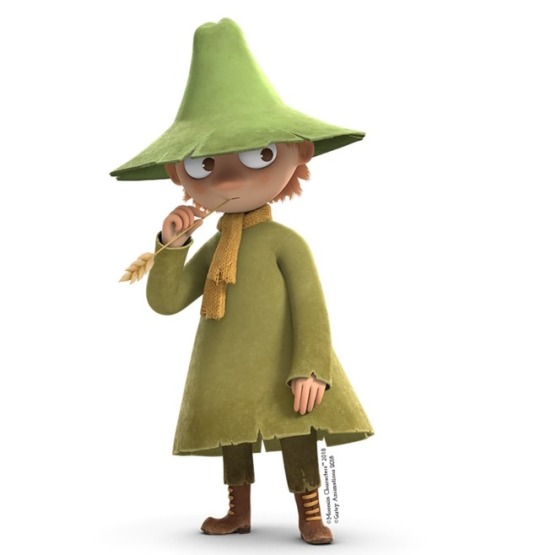
I’m not a very big Moomin expert or anything, but based on what I know I think Snufkin from the new 2019 show Moominvalley is my favourite version of him. I love the Snufkin from the earlier show, but I relate to and I’m very interested in the way they portray this Snufkin. He is voiced by Edvin Endre, who himself explained he did not want to imitate the former and gave the character a more youthful voice (Snufkin and Moomintroll are explicitly teenagers in this version). I’ve seen some people questioning what is his accent–he’s Swedish (fitting, as the Moomins’ creator Tove Jansson was a Swedish-speaking Finn and the story itself takes place somewhere around Sweden and Finland).
Snufkin is a calm philosophical wanderer who enjoys his own solitude, nature and playing and expressing himself through his harmonica. He’s an expert at living in nature, prefers to have very little material possessions and values freedom. In turn, he hates controlling authority figures and rules. He is greatly admired for his independence and wisdom, especially by small forest critters who don’t have much self-confidence of their own. After he befriended the Moomins, he stays in Moominvalley but always leaves south during winter and returns in spring when the Moomins wake up from hibernation. Him being able to go and leave how he pleases is extremely important for him, though his best friend Moomintroll always misses him greatly as a result.
With all these characteristics, Snufkin is generally considered the ’cool’ character, both by the viewers and the other characters. However, he does hide some insecurities of his own, and one adaptation is explored in great detail in this 2019 version. According to Edvin, Snufkin has always identified with solitude and he is conflicted between being attached to Moominvalley (especially Moomintroll) and being on his own. Notably, he doesn’t seem that close to the other cast in this version, with Moominpappa (who is not the most delicate with words) calling him an ’odd fellow’ and ’antisocial’. I’ve also noticed that this Snufkin is not above getting some slapstick and silly moments.
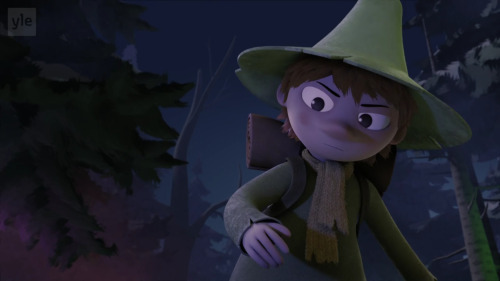
In the second episode where he is introduced, we learn a lot. Snufkin is returning to Moominvalley as always, but this time he’s late and has a hard time creating his yearly spring tune. He is frustrated and imagines a pile of snow as Moomintroll, explaining to him he’s not ready to come back yet and apologising that he can’t think of him right now. He gets more and more frustrated when he notices he’s followed by one of those admiring forest critters and grumpily tells him to leave, as he cannot create music when he’s being watched. But the overly talkative creature comes closer anyway and fanboys over Snufkin, who gets really uncomfortable and says you can never be free if you admire someone too much, a feeling he himself knows.
Both figuratively and literally the critter gets too close for comfort, asking Snufkin to give him a name (apparently, the creature is considered so insignificant he doesn’t have one) and talking about how much Moomintroll always misses Snufkin and how close the two are. While he has tried to be nice and control his anger (quite poorly, but still), Snufkin lashes out and says he goes when it suits him and maybe he doesn’t go at all. The sad critter attempts to leave, but Snufkin quickly feels bad and gives him an unique name-Teety-Woo. Teety-Woo is overjoyed, feeling he now has an identity, and quickly leaves when Snufkin isn’t looking. Realizing he is all alone, Snufkin suddenly gets sad and starts to feel massive loneliness, and looks for Teety-Woo in vain. He feels so alone, he feels it’s not like him and he must be ill.
Afterwards, he has a nightmare where he wakes up and continues to move towards Moominvalley, getting more and more desperate, even when he loses his beloved harmonica and a bunch of branches and roots try to grab and restrain him (SYMBOLISM). He smiles in relief when he sees the Moominhouse and a light in Moomintroll’s room. He walks past a hedgehog, who suddenly talks to him and mocks him, telling him there’s no point to come back because he’s been gone so long no one remembers him anymore. Snufkin is bothered by this, but gets even more determined to reach Moomintroll and climbs the ladder to his window. But much to his surprise, he sees Moomintroll has ‘replaced’ him and is happily playing with Teety-Woo. Snufkin is so shocked he falls down the ladder and wakes up from the nightmare shouting for help. He meets Teety-Woo again in friendly terms, confirms that the critter hasn’t actually went to Moominvalley and admits he really wants to see Moomintroll and finally creates his spring tune. You’d expect a very emotional reunion after all of this, but instead Snufkin acts very cool and restrained and formal, not telling Moomintroll about his worries nor giving a hug Moomintroll clearly wanted.
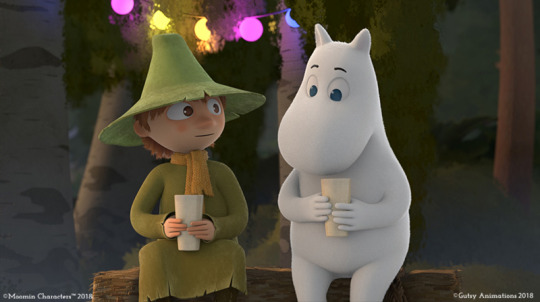
Another part I found interesting and very relatable as someone who gets anxious during parties; some time later, Snufkin is in a party with Moomintroll, likely invited by him, but despite smiling doesn’t seem comfortable. According to him, he doesn’t dislike people, but he sometimes feels trapped in social situations and needs to be alone for some time. When Moomintroll leaves to refill their drinks, Snufkin instantly gets visibly uncomfortable looking at the people around him and anxiously grasps his hands. When Moomintroll returns, Snufkin has left without a word, feeling too overwhelmed to stay any longer. He feels guilty and assures he will go back when telling this story to Little My (it’s very sweet to me that he feels relaxed hanging with Little My of all people and tells her about his feelings, which could be foreshadowing the possibility that they’re half-siblings like in the original stories). Long story short, Snufkin gets into a conflict with a park keeper after he bumps into his fence and regulation signs while trying to relax in the nature. Due to a misunderstanding, Moomintroll and Snorkmaiden are blamed for his vandalism and get locked in jail, making him feel even more guilty. He attempts to rescue them and then takes their place in jail as he confirms they’re innocent (and Snufkin obviously really isn’t a fan of being locked up or bossed around by police). Moomintroll comes up with a plan to get him out quicker which at first seems like a great punishment. Snufkin doesn’t realize Moomintroll’s plan at first and believed Moomintroll was truly angry with him, and genuinely felt ’it’s all he deserves’ after leaving Moomintroll at the party (ouch).
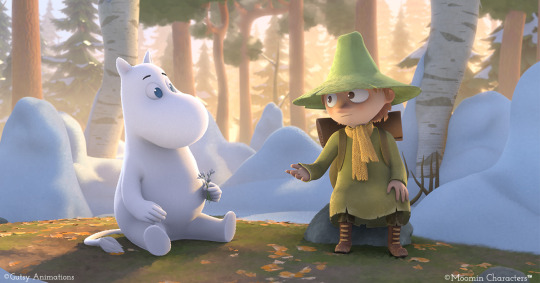
Snufkin can be too distant and Moomintroll can be too dependant, but the narrative never treats either of them as the bad guy for it. Snufkin doesn’t want to be vulnerable in front of Moomintroll and feels needing someone besides himself will hold him back, while Moomintroll is so attached to Snufkin it can make him feel bad but he doesn’t voice his discomfort because he wants to respect Snufkin’s boundaries. They just need to get better at communication and be more honest about their feelings, and the series seems to be leading up to this.
1K notes
·
View notes
Text
Ideal RHATO
Okay, so I’ve done some thinking. While Red Hood and the Outlaws was an interesting concept; give Jason friends and a team of his own, get him out of the Batfam Shadow, it’s been bogged down by L*bdell spotty writing and questionable Editorial decisions. So I’ve taken the time to think of what I would personally want the Outlaws to be.
First of all, I don’t believe that Jason would be better of if he remained solo. While he does deserve a good solo run other than UtH, the idea of permanently sequestering from creating meaningful, recurring relationships with other heroes is just repulsive to me. He should be allowed to have friends and people to talk to outside of the Batfamily guys, there’s only so many adventures he can have by himself before they all start sounding the same. You could even have him gaining friends as part of his character development.
Okay! So let’s begin
In my version, the Outlaws would be a more obvious antihero team. They take cases by those who feel that regular heroes can’t help them, that they won’t go far enough to achieve justice. The Outlaws won’t kill often, but it would usually be awful criminals like drug dealers, traffickers or those in charge, but if they don’t kill, they won’t be above dissing out harsh, lasting punishments to those who cross them. There could be the possibility of them being a team looking for redemption, but I’ve never really thought about them going in that direction.
Btw: This will be a hard reboot, everything from New52 to Rebirth regarding RHATO will be completely retconned, because Lobdell wrote almost all of them and despite what people want to believe most of it is bad save for some barely passable moments
Outlaw Members
Jason Todd
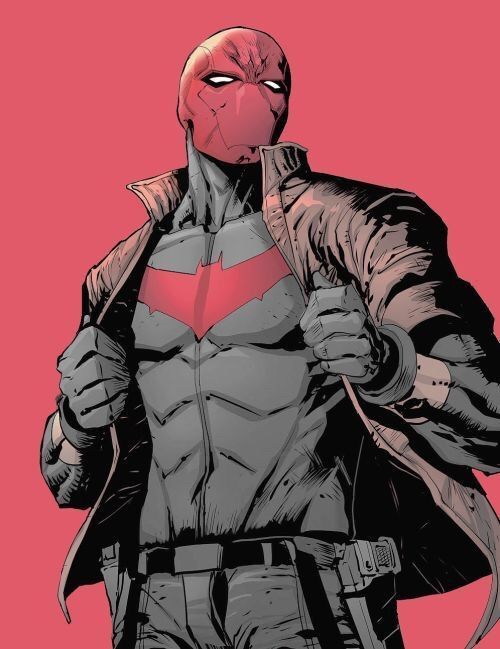
Can’t have the Outlaws without their infamous leader. Like I said above, I believe that having his own team can be a good thing for Jason, he can establish a history disconnected from his history with Bruce and actually start to move on. I’d imagine him being a reluctant leader, preferring to work alone but admitting that having people to rely on has made his mission a lot easier. He’s a very driven and calculated person, and after reading Arkham Knight Genesis, I have no doubt in his leadership skills and his ability to turn a ragtag group of antiheroes into a team to be reckoned with.
Idk if I’d keep his All-Caste stuff. I know that it was probably created to give his backstory something that stands out, since he’s the third Batfam member to have the League of Assassins in his backstory and isn’t the only one that’s died before, but he barely uses the All-blades or brings up the All-Caste to the point were you can omit it and don’t really have to do that much to replace it. At this point, I’d accept Talia making him train with Brother Blood over the All-Caste.
I’d probably say that the Lazurus pit Talia used to bring him back was kinda special, giving him a minor healing factor and increasing his strength, idk, something small.
Eddie Bloomberg
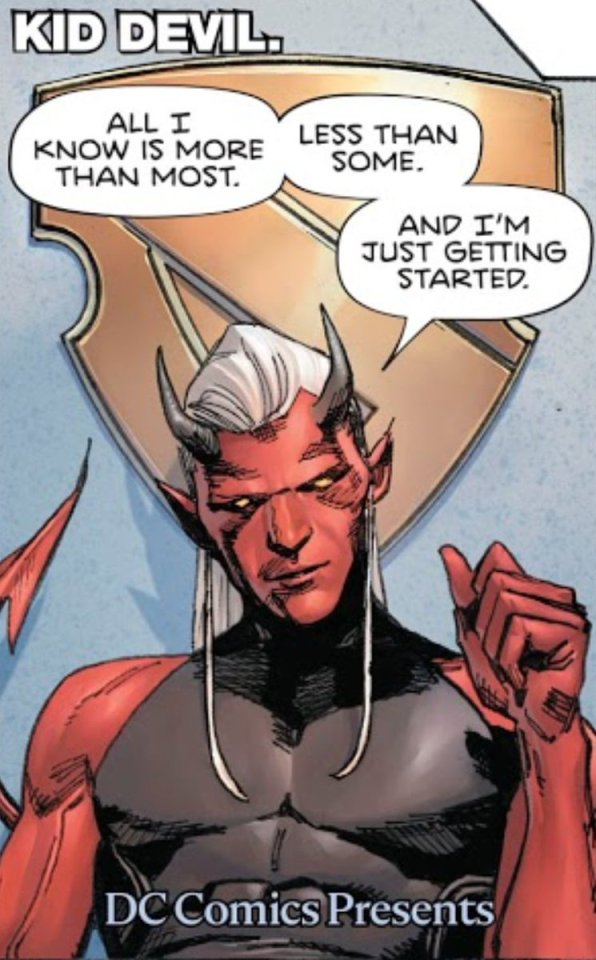
(I hate Tom King and this dialogue too but I wanted a recent image of him)
Did you know that unlike Roy Harper, Eddie was actually Jason’s best friend pre-reboot? Most people don’t because DC doesn’t care about using pre-established canon or developing its less popular heroes! 🙃
Okay, I used to be a huge fan of Jason and Roy’s friendship in New52 RHATO, but then I learned that Roy was originally Dick’s friends, that his personality was dumbed down for New52, Roy actually hates mercenaries and would never become one, they only used Roy because he was more popular and that most Titan/Roy friends actually hate his New52 counterpart and friendship with Jason. While I believe that Roy and be both friendship with Dick AND Jason (but in different ways. Dick is more of a close friend while he and Jason should have a more big brother kind of relationship), I have to admit that DC dropped the ball here, and it would be easier to just scrap everything instead of trying to make it work.
Eddie’s personality is actually quite similar to New52 Roy’s, and he and Jason already have unexplored history, so switching Roy with him won’t mess anything too much.
And now, I hear you ask “Ani, what about the Outlaw’s being an antihero group? Wouldn’t that make Eddie stand out?”, and I will reply “Don’t worry, I have a plan!”
Back when Eddie first got his powers, Neron, the king of hell at the time (?) wanted Eddie to be his protege, but Eddie refuses. But what if Neron was more forceful? Eddie could be offered, now powerless again because of the events of TT (but his death is retconned to just getting badly injured), to become Neron’s protege once again. With nothing left to lose (his relationship with Blue Devil is still in the fritz, Teen Titans no longer seem to give a damn and Rose & Jaime is still off doing their own things), he takes it. I guess he’s probably look different with more of Neron’s power coursing through his veins, but the point is that Outlaws become a “Fall from grace” for him. He’s trying to still be a hero, but as Neron’s influence continues to grow, his ability to tell right from wrong gets more and more clouded.
He’s the one to approach Jason with the idea of being a team, wanting to relive the “Good Ol’ Days” when they were younger and less bogged down with personal trauma. While Jason is reluctant, he admits that since being self-exiled from the Batfamily that it’s been kinda lonely, so he agrees, but only short-term. Eddie then segways into the next member of their burgeoning group–
Rose Wilson
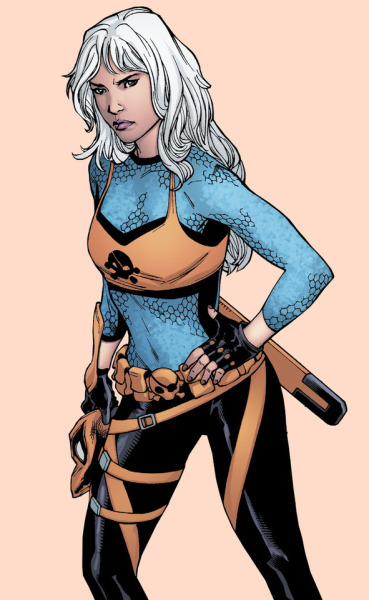
While pre-reboot, Rose and Jason did not have the friendliest interactions, with her holding a blade to her throat while his brothers threatened him with a crime he never committed. Post-reboot, he and Rose seem to have a more “friendlier” relationship, but the Wilson family have been rebooted at least theee times in both New52 and Rebirth, so who knows if they even still know each other now,
Rose and Eddie were very close friends in Teen Titans, and I think that getting Rose away from the madness of her family and father could be good for her character.
Eddie manages to convince her to join the “Outlaws”, but like Jason, she goes into it thinking that it’ll be a one-time thing. She cares a lot about Eddie, and sticks with the team to make sure that he’s doing alright. She probably could have an arc were Nightwing confronts her on her work in the Outlaws (since the other heroes see them as white-hat mercenaries) since he mentored her in being a hero, so it could be about dealing with what other people expect of her.
Essence
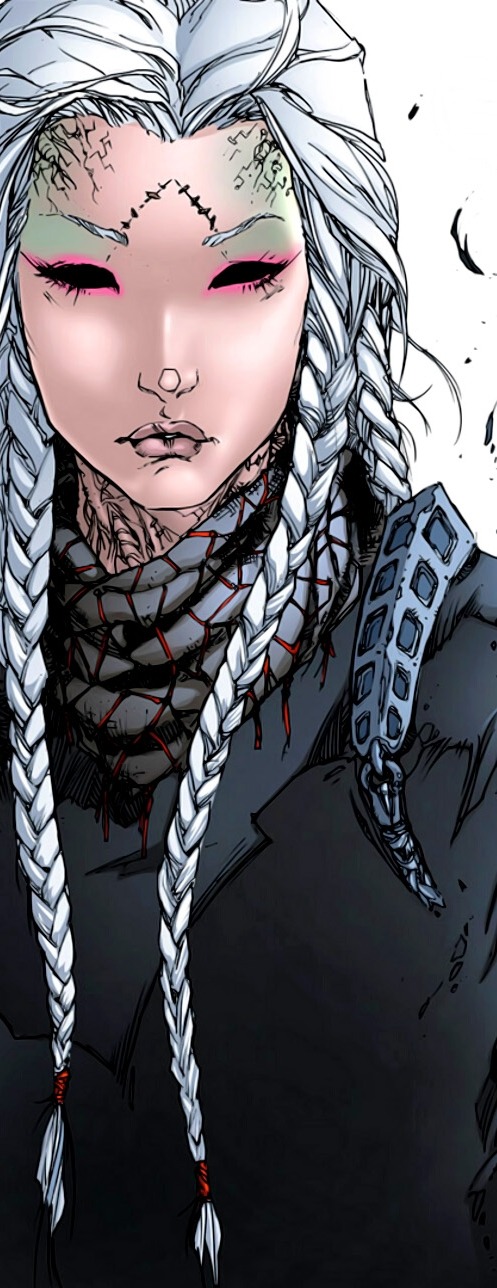
While L*bdell might be basically a shit writer, he does create interesting concepts. With a better writer, Essence could be a very interesting character, watching from the shadows and judging whether or not the Outlaws are actually “good” people, before she eventually starts taking a more active role in helping them punish criminals.
While she would at first interact solely with Jason, asking him questions about his deeds and ordering him in what direction she feels is best, she would eventually introduce herself to the rest of the group. I think she’d get along best with Komand’r, while the others might test her absolutism, Black-And-White morality a bit.
Rankorr (Jack Moore)
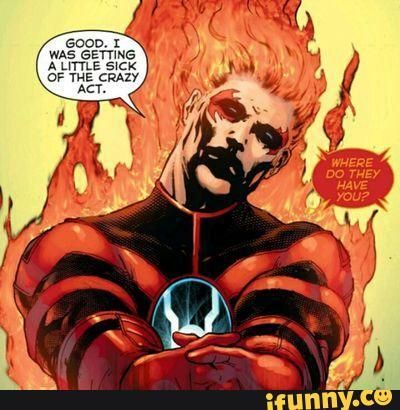
I know that there’s some people who want Guy Gardner to be Jason’s lantern, but what about a lantern who is close to Jason in age and actually fits the Outlaw theme?
Jack Moore is a Red Lantern, not only a Red Lantern, but the first human lantern who is also the first Red Lantern to be capable of creating constructs. He struggles with his rage, and deep down, he wants to enjoy a normal life on earth.
Maybe after Red Lantern (retconning Lobo or if not, he’s brought back using Red Lantern Blood Magic), he decides that the RL’s are a bit too cult-like for him and tries to lay low on Earth, finishing his literature degree and opening up a small bookstore somewhere in London. He’s close with Guy, but still can’t/refuses to let go of his rage, so Jack is still a RL
Of course, keeping his rage at bay is hard work, and after witnessing police brutality one more time, he loses control.
The Outlaws were hired by the family of the victim to make the officers see justice, but after seeing Jack work, they realize that this might be their easiest case yet.
Afterwards, Jack tries to downplay the entire thing (before resorting to threats when the Outlaws won’t listen), but Jason eventually convinced him that his talents would be wasted just being a civilian (and that his rage will only get worse if he continues to just let it boil without an “outlet”) so he joins the team
Blackfire
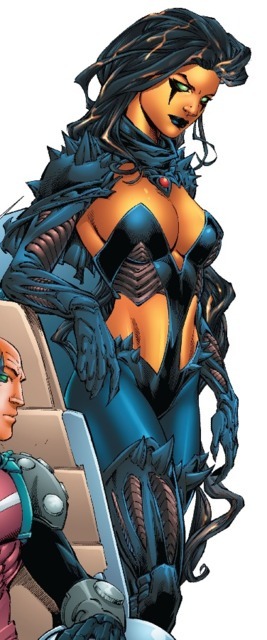
I’ve read Komand’r’s backstory, I know how bad it looks. However, in a medium where retcons and reimaginings are features instead of bugs (and can benefit a character’s story if done right), I really think it could be possible to make her work.
After reading New52 RHATO, I began thinking that it could be so much better if not only Eddie took Roy’s spot, but also if Komand’r took Starfire’s, since I feel like she had more potential beyond “Kori’s evil disabled sister”, “War Criminal” and “Struggling queen of Tamaran”
First, I’d change her pre-reboot backstory so instead of taking over the Gordanians, she is instead captured by them after Starfire frees her from the Psions (Komand’r still hates her sister and refuses to follow her). Through her clever mind and manipulations, she manages to earn favor with Lord Damyn, feigning romantic interest. Of course, given Komand’r’s nature, she ends up killing and replacing him, but her rule doesn’t go over well and she is again recaptured, but this time she’s brought to Earth.
Realizing that she’s now trapped on the planet whete her sister has become a successful and popular hero, Komand’r is at first angry, and then conspires to free herself and take revenge on her sister (who she still blames for everything despite that not being the case).
The Outlaws bust the alien trafficking ring, and Komand’r, seeing her chance, decides to show off and make nice with them to eventually use them for her revenge.
She finds Eddie and Rankorr easy to manipulate, but she bumps Heads with Jason whenever she tries to take his role as leader away from him and finds Rose’s mind to be “weak”. Overtime however, she bonds with Jason over feeling inferior to their siblings, realizes that her anger shares Rankorr’s intensity, and grows a genuine friendship with Rose and Eddie
Oh yeah, and maybe she tries to make things right with Kori
Artemis Grace
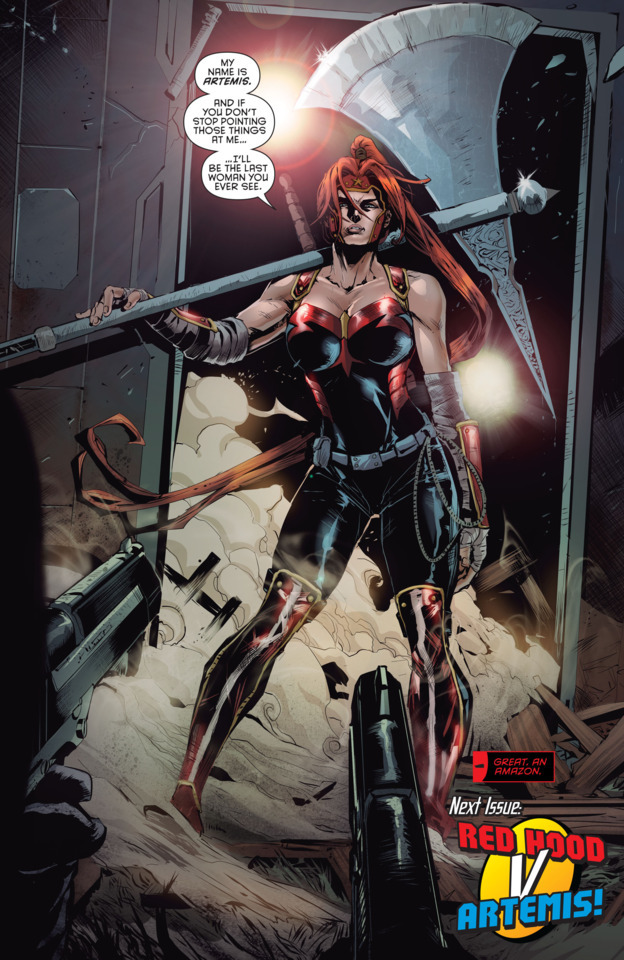
What would the Outlaws be without the greatest Amazon to have ever lived? Nothing, that’s for sure.
While I don’t agree with Jaytemis (at least not yet), I have to admit that Jason would be a fool not to like her. She’s a cool, confident character with a lot of interesting lore behind her.
Her joining will probably be pretty close to canon. The Outlaws are tasked with going after Black Mask, and Jason decides to go undercover, as the Red Hood still has his fingers in various criminal pies. While investigating, he runs into Artemis, who is looking for the Bow of Ra, and rest is history.
I feel like she’ll get along really well with Rose and Komand’r and maybe she’ll date one. She’ll definitely view Eddie a bit dismissively, and she isn’t a huge fan of demons. Rankorr would probably come off as stuck up to her.
Bizarro
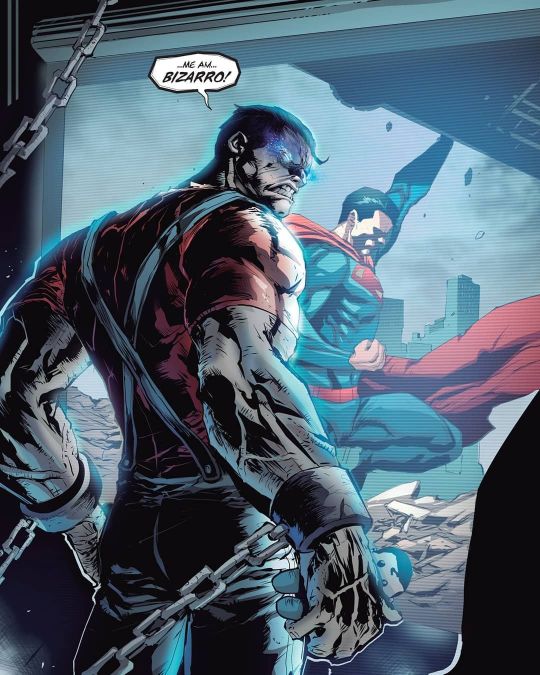
Anyone who knows me will know that I’m am not a huge fan of Bizarro clones. I consider them to be an overused concept (that sometimes feels as if it relies on gene superiority, but idk if I’ll ever fully process my dislike for them), and the fact that as the time I’m writing this, there are at least four currently in continuity does not enamor me with the concept more.
However, after re-reading RHATO a few times, I’ll admit that the Outlaws’ Bizarro has grown on me. Since he already kinda has a unique name (Bizz), all I think he needs is a more visually distinct costume (doesn’t even have to directly reference Superman, but I can go 50/50 on the backwards “S”)
The Outlaws getting Bizz is exactly the same as canon. I’d imagine that he and Eddie would be as close as brothers. While Rankorr might find Bizz’s way of thinking and speaking to be annoying, I’d think that Rankorr will eventually warm up to him and probably teach him how to read and help Artemis teach him. Komand’r and Rose will probably be less receptive to him, but who knows
August Heart
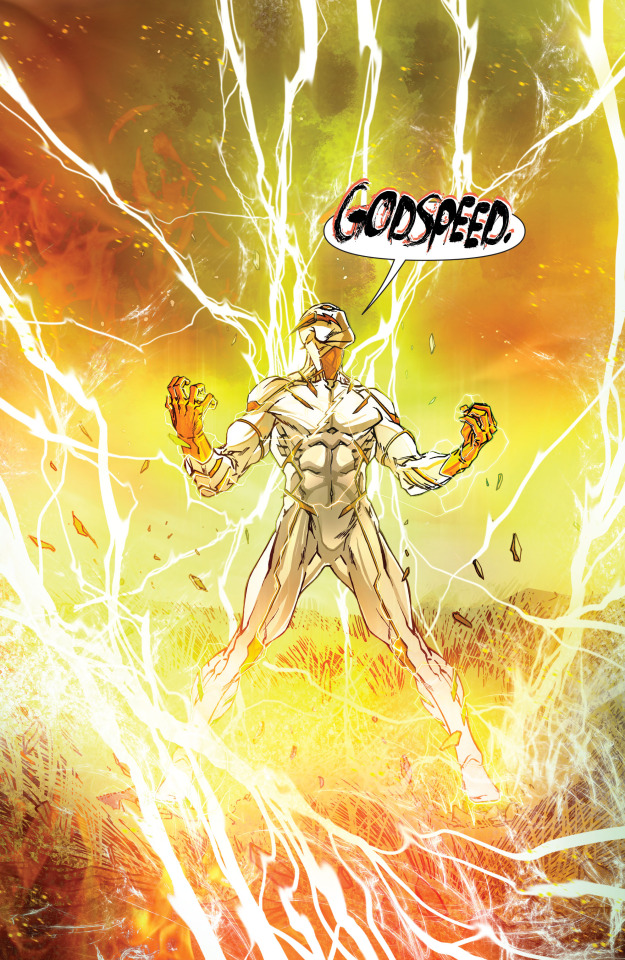
I’m a Godspeed fan first and human second, we’ve been knew.
In all seriousness, Godspeed is the perfect Rebirth era character for RHATO and the fact that he and Jason still haven’t met is why DC doesn’t have any rights.
Okay okay, but he’s honestly a perfect fit. Like Jason, he also kills when dealing with crimes, but he isn’t so good and knowing who’s guilty and who isn’t just yet.
This will probably be after Death of the Speedforce, with August finally making things right with Barry, but still not forgiving himself for everything that happened. Deciding to self-exile himself rather than go back to Iron Heights, August travels, trying to figure out what do to do next, trying to follow Barry’s rules (which he finds to be very wishy-washy) to the best of his ability.
Eventually, he learns that Black Hole is still running, and against his better instincts, he goes after them.
His trail of lightning destruction catches the eye of the Outlaws.
Barry, realizing that his best-friend might need someone who can actually be there all the time to help reign him in, Barry goes to the Outlaws and asks them if they can help him once they catch up to him
They do in the form of offering a spot on the team.
August is very self-assured (even if it is hiding a softer, more emotional center), but has proven to be able to work with others, so I can see the other Outlaws coming to like him. They might find him a little cocky/early to jump the gun, but still a trusted and valued member of the team.
Since every Robin has their own flash, it only makes sense to finally give Jason (and have them date) a speedster of his own, and it should be someone who fits his morals, and who else could Then the speedster fans literally call “The Red Hood of the Flashfam”?
Final Thoughts
Other possible members I would consider/accept are
Eradicator Superman
Koryak
Vanessa Kapatelis/Silver Swan lll
Simon Amal (Crux)
Danny Chase
Clone!Roy Harper
Connor Hawke
Orm Marvius
Man O’ War
Lagoon Boy
Scarlet
Zachary Zatara
Thomas Merlyn
Ragman
Bleez
Walter West
Even with a cast as sizable as the one I just listed, with a good enough writer, there could still a few minor side characters. I would personally want the them to be
Scarlet: Jason’s former sidekick. She could be either a civilian who he talks to get experience some normalcy or the leader of her own version of the Outlaws made of up the Generation Outlaws we meet in RHATO #37-40. Either way, it could contrast with Bruce and the way he (mis)treats his own sidekicks and family
Zachary Zatara: Eddie’s old friend who helped him get his devil powers. Zachary would definitely be worried over Eddie once again accepting Neron’s power and will want to try to help. Whether he suceeds or not will depend if the writers want to go in that direction
Isabel Ardila: She’s a nothing character, but there’s a small chance that with a better writer, she might gain an interesting personality or an actual purpose in RHATO
Talia Al Ghul: before the reboot, Talia was Jason’s mentor figure and even gave him a cool dagger. It would be so cool if we can bring that back and erase Morrison’s problematic charactization of her. Maybe the dagger she gives Jason could be an All-Blade or smth. They’d definitely take a few cases from her however
Batfam, Titans and respective groups: it would have to happen eventually. It could lead to some interesting, angst filled conversations. And who knows, maybe they’ll actually make progress with their issues
But this post has gone on long enough. I just really wanted to talk a bit about my ideal Outlaws team that I will never see anywhere except for my dreams because mass media hates me and DC still thinks that Lobdell deserves to write Jason 😔😭
#rhato#red hood and the outlaws#jason todd#eddie bloomberg#rose wilson#essence (dc)#rankorr#jack moore#komand'r#artemis grace#artemis of bana mighdall#bizarro#august heart#godspeed#jaugust#redspeed#jaygust#my post#long post#i have a lot of rhato feelings okay?#danny chase#simon amal#crux#eradicator superman#koryak#outlaws
476 notes
·
View notes
Note
Have you seen Crimson Peak? *SPOILERS* for that but basically Ben’s death reminded me of that except worse executed and an actual betrayal of premise because it’s SW and Crimson Peak isn’t betraying its genre or theme. But Crimson Peak had the same whiff of “abuse victim who must die to redeem himself” and “cautionary tale for women to be strong and alone” that made me disillusioned with del Toro
I saw it in the cinema when it came out. This was my reaction/critique. I did find it very disappointing and it annoyed me how salty del Toro was about its bad reception because he kept saying people didn’t understand it was Gothic Romance, not straight horror. In fairness to him, a lot of people didn’t understand that (mostly because it was marketed as a horror movie because studios are fucking morons and never learn not to lie to the audience), but I know exactly what he was trying to do, I just don’t think he succeeded in doing it.
I don’t agree that it’s a cautionary tale, at least I don’t think del Toro at all intended for it to be even subconsciously. Edith’s love for Thomas is vindicated, it’s not that she can’t save him, it’s that he couldn’t let go of Lucille. He tried to have both. His inability to break free from her killed him. But the point in the film was Edith truly loved Thomas and he truly loved her and that’s why he isn’t trapped in the house after death the way the other ghosts were. She wasn’t wrong to go after what she wanted or to follow a mystery: she released a bunch of tortured spirits and stopped the Sharpes from hurting anyone else. She becomes a writer like she wanted. I don’t think she is punished for her choices at all. She got to consummate her relationship with her sad murder boy on her own terms and become an adult woman in charge of her own destiny. Her pining childhood friend the doctor didn’t save her, she actually saves him, and he’s not rewarded with her chastened affections after the Bad Boy abandons her; he’s staying in the friendzone and Thomas returns to her side to show her she was right about him.
But it’s a mess because Thomas is too much of a victim for us to be okay with him dying while also having too much agency for us to feel he needs to be rescued. It’s fine that it’s tragic and dark, it’s Gothic, and I don’t feel like GDT is saying Thomas needs to die to be redeemed at all. It’s not even really a question of redemption. GDT thinks we should love and feel sorry for monsters whether they redeem themselves or not. Thomas doesn’t live because Lucille can’t escape the house and he can’t escape Lucille, not because he doesn’t deserve another chance. They were born romantically doomed by circumstances and needing to be all things to each other, he’s too dependant on her to make it into the future where she won’t go, and both of them are eventually crushed by the weight of the past. And that’s okay because it isn’t a fairy tale, it’s a ghost story. It’s about the trauma of the past irrupting into the present.
The reason it’s unforgivable and unacceptable for Ben to have been born doomed is because SW is about the power of individual choice and it never being too late to make a different choice. Foreboding Gothic doom hanging over him is completely inappropriate, his entire family giving up on him and never learning better is so FUCKING disgustingly inappropriate. The idea of an inescapable dark fate is totally anathema to sw’s message, the idea of love ever not being enough to save someone is completely ass-backwards to what the story has always been about. And since the Skywalkers were created by the Force, it makes the Force actively malevolent that every single one of them had a short, miserable life of pointless suffering, endless unrewarded sacrifice, and failure.
Rey doesn’t get to consummate with Ben, she returns to childhood under her creepy Velvet Elvis incestuous self-adopted new dead parents. To replace her original dead parent delusion which she was actually right about all along because character growth is for indie movies, but fuck those people anyway, they may have been heroes but their names aren’t brandable.
Anyway, Edith grows up. She isn’t told to get back in her cage and put on her immaculate white little girl outfit, she’s a woman, her nightgown has blood on it. It’s actually reasonably bittersweet, because she did save her husband. She saved the ghosts. She’s going to be her own person and pass this story on, her love doesn’t feel like a waste. I don’t think the movie works and I don’t think it’s emotionally satisfying, but it’s not a fundamentally regressive or broken narrative. Thomas couldn’t let go, Ben did and he died anyway. His slow-motion suicide being eventually allowed to benefit the ~right cause~ is the only relief he gets for a lifetime of suffering there was literally nothing he could have done to escape.
Rey didn’t grow up, she didn’t save Ben, she didn’t save the galaxy, she’s a sexless empty vessel for a nostalgia which doesn’t even make sense.
42 notes
·
View notes